
What international students should know before starting a PhD
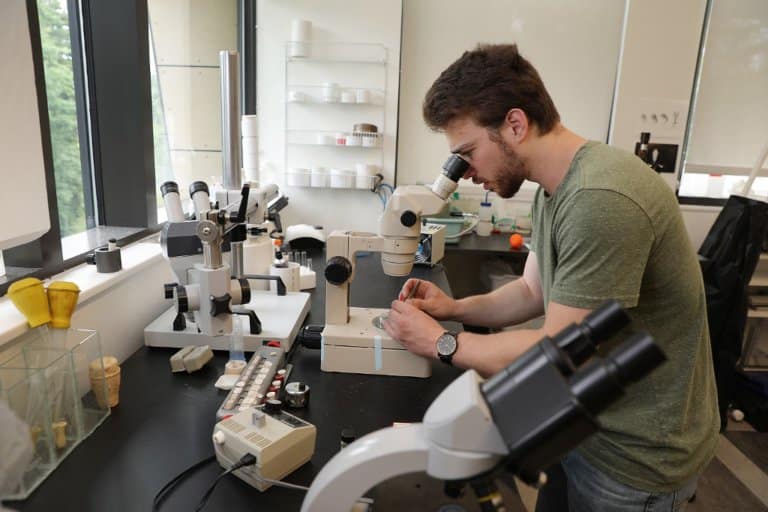
Becoming a PhD student is no easy feat — even more so if you are an international student.
During this period, you are a researcher. Imagine being responsible for forming your hypotheses and defending them in front of your supervisor or peers.
This can be a drastic change of pace from studying for your bachelor’s or master’s degree — which is more passive and comes with less accountability.
What’s more, you might not have time for your friends, family or even yourself. Instead, you’ll meet with supervisors, craft your PhD research proposal and interview people. You can expect to write a lot — and to meet the deadlines that come with it.
It’s a huge commitment, so knowing what to expect can help you adapt to this change. Don’t worry, though, as we will guide you through all you should know before starting your PhD:
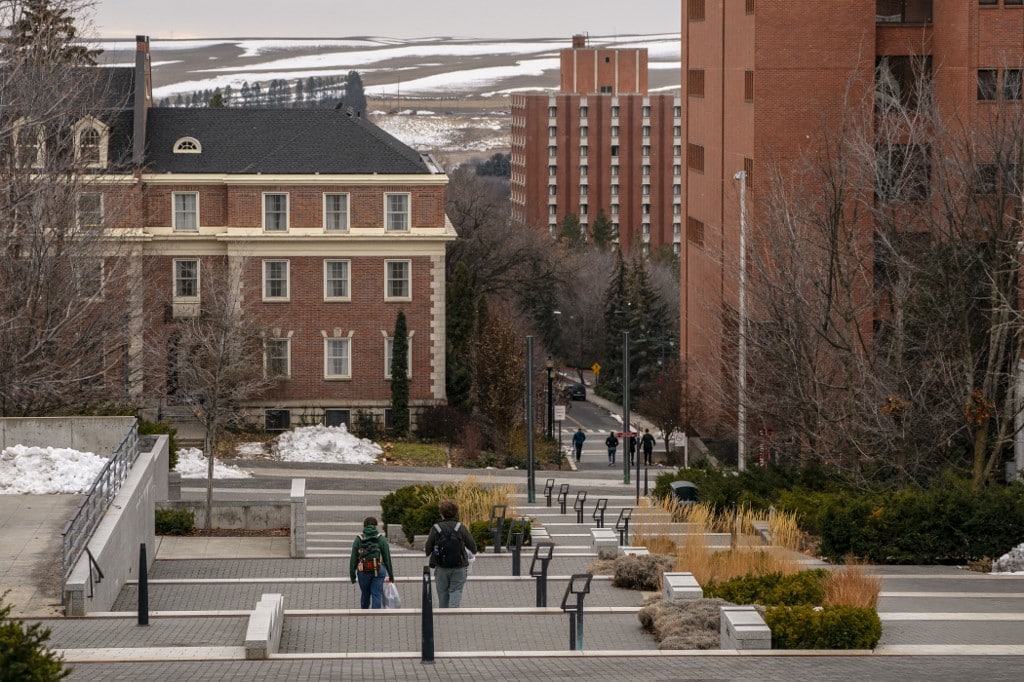
Starting your PhD with the right expectation and mentality can help you put your best foot forward. Source: David Ryder/Getty Images North America/Getty Images/AFP
What does PhD mean?
A PhD, or Doctor of Philosophy, is the highest possible academic degree you can obtain as a student once you submit a thesis or dissertation.
These are academic papers that you write based on extensive and original research done in a chosen field.
On average, it can take you up to eight years to complete your PhD. This will change according to the programme, the subjects you’ve picked and the university offering the programme.
What does PhD stand for?
PhD is short for (Ph)ilosophiae (D)octor in Latin. The word “philosophy” comes from the Ancient Greek philosophia, literally translated as “love of wisdom.”
Are PhD students doctors?
You are entitled to use the title “Dr.” once you graduate with a PhD.
They are different from the doctors you see in the hospitals as PhD graduates as social and physical scientists who have conducted and evaluated published research.
Do PhD students get paid?
Yes. They receive a salary, which is also known as a stipend. A higher stipend can help you to cope with an increased cost of living.
Currently, the average cost of living is around 1,000 to 1,600 pounds per month, including rent. This range can change depending on your lifestyle and whether you are staying with a friend.
The increasing cost of living, however, have pushed stipends below the living wage, The Guardian reported.
This has resulted in some candidates struggling to pay rent and forcing them to work part-time jobs.
In June 2022, UK Research and Innovation (UKRI) announced that the minimum stipend for UKRI-supported students is due to increase by 2.9% for the 2022-23 academic year.
4 things to consider before studying abroad as a PhD student
1. choosing your research topic.
We get it: you want to write something impactful that you can bring forward in your career. It’s normal to feel stuck when thinking about a research topic .
Lucky for you, there are many ways to be inspired. You can start by attending conferences.
Even if you don’t have a paper to present, these events can help you source research ideas and connect with experts in the field.
Linkedin is a great alternative, too. Some faculty members share bits of their research topics on the platform. Try typing “#researchtopic” in the search bar and you will be able to filter through the relevant post.
2. Applying for the right student visa
Give yourself ample time to apply for your student visa. We recommend that you read up on how to apply for an F-1 or Tier 4 student visa if you plan to do your PhD in the US and UK, respectively.
This handy step is crucial to help you avoid any visa delays that can jeopardise your study plans.
One student had his offer to pursue a PhD programme at a Canadian uni withdrawn after being forced to defer his admission for a third time.
At the time, he had been waiting for his Canadian student visa to come through for 18 months.
Generally, most international students would require a student visa to do their PhD. Do check if there is an agreement between countries that allow citizens to move freely between them.
For example, a PhD student from New Zealand will not need a student visa to study in Australia.

As a PhD student, you will teach or become a research assistant. Most unis will pay you for this work in the form of stipends. Source: Tolga Akmen/AFP
3. Look for scholarships and financial aids
Lucky for you, there are scholarships for PhD students. Countries like the UK value a strong research culture, so it’s no surprise that many UK unis offer good scholarship packages that cover your cost of living plus an annual stipend or maintenance grant.
Some scholarships even offer you an allowance.
Those studying for their PhD in the US can consider applying for financial aid .
4. Know how to protect your mental health as a PhD student
Mental health among PhD students is poor, according to a survey done on postgraduate students in the UK.
As a PhD student, it can often feel like your wellbeing is slipping away.
Whenever this happens, feel free to reach out to your supervisor.
Aditi Paul wasn’t afraid to do this while pursuing her PhD at Bowling Green State University.
“I took a course on statistics for social science. Since it was my first time studying the topic, I would visit my professor during office hours every week,” Paul shares.
“Here, I would ask for more clarification of my weekly assignments to ensure I was on the right track.”
You can also talk to a friend or walk into your uni’s wellbeing office if you feel overwhelmed.
Use an on-campus mental health service, such as counselling, if you need professional help.
Always remember that there is always someone you can talk to on or off campus.
You can also listen to mental health podcasts or download apps like Headspace to relax your mind.
Popular stories
Us$14,895 for a veterinary science degree: the cheapest countries for you to pursue animal healthcare.

The immense value of an English Language and Literature degree, according to an entrepreneur

5 best luggage brands for students and travellers

The marketing exec living her best life as a student ambassador in Melbourne

Is it a good time to be getting a PhD? We asked those who’ve done it
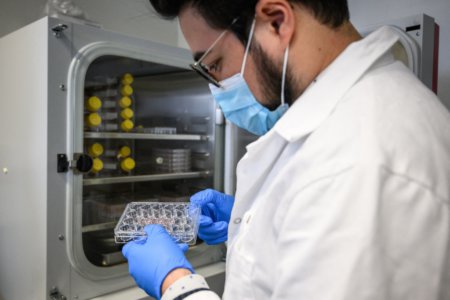
Countries offering the highest PhD stipends
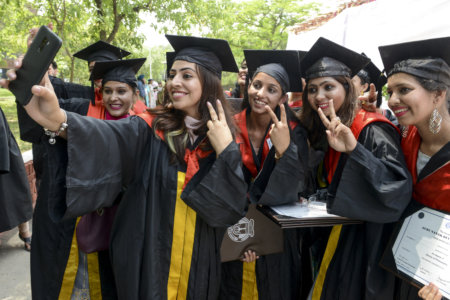
5 countries that offer free or very cheap PhD programmes
- Communications
- Computer Science
- Criminal Justice
- Environmental Management
- Forensic Psychology
- Healthcare Admin
- Human Resources
- Project Management
- Social work
- Special Education
- Sports Management
- Supply Chain Management
- Adult Education
- Business Intelligence
- Early Childhood Education
- Educational Technology
- Homeland Security
- Information Systems Security
- Information Technology
- International Business
- Management Information Systems
- Nonprofit Management
- School Counseling
- Academic Publishing Guide
- Building a Graduate School Resume or CV
- Choosing Between a Thesis or Non-thesis Master's Degree
- Expert Guide to Studying Abroad
- FAQ: Online Master's Degrees
- Grad School Guide Book
- Graduate School for Students with Disabilities
- Green Graduate Degrees
- How to Be a Successful Grad Student
- How to Choose the Right Graduate Program
- How to Get a Master's Degree in an Unrelated Field
- How to Transfer College Credits in Grad School
- How to Write a Winning Personal Statement
- Inside Graduate Admissions
- Ivy League Grad Schools
- Master's Degrees for Veterans
- Master's Degree for Women
- Mental Health in Grad School
- Progressive LGBTQ Graduate Degrees
- Should You Apply for a Graduate School Assistantship?
- Surviving Grad School with a Family
- Taking a Gap Year Before Grad School
- Women in STEM Graduate Resources
- Writing a Successful Statement of Purpose
- Alternative Ways to Pay for School
- The Best Part-Time Jobs During Grad School
- Company Funded Graduate School
- FAFSA For Grad Students
- Financial Aid Resources
- Graduate Student Loans
- Paying for Your Master's Degree
- Paying Off Student Loans
- Paying for Your PhD
- Fellowship Opportunities
- LGBTQ Scholarships
- MBA Scholarships
- Scholarship Resources
- Scholarships for Veterans
- Scholarships for Women
- Crushing the GRE Guidebook
- GMAT Guidebook
- Guide to the LSAT
- MCAT Prep for Medical School
- Study Guide: Exam Resources
- TOEFL Prep for Non-Native English Speakers
- Resources Studying Abroad for Graduate School
THE EXPERT GUIDE TO GRADUATE SCHOOL ABROAD Explore International Programs, Find Funding Options and Key Insight for Studying Abroad
Graduate school abroad doesn’t have to be a dream scenario – it can be easily within reach. Utilizing this guide’s insider perspective and experience, prospective graduate students can find programs that match their passion, learn what to expect and anticipate when living abroad, and find scholarship resources to help fund their studies.
- Turn Your Study Abroad Dream Into A Reality
10 Expert Tips for Selecting a Graduate School Abroad
Insiders’ share 10 ways studying abroad will change your life, learning curve: challenges of culture and learning abroad, break cultural barriers, not your bank – scholarships, grants & fellowships, cost comparison, the countdown to departure.
- Study Abroad Housing Options
TURN YOUR STUDY ABROAD DREAM INTO A REALITY
In the end the allure of experiencing a part of the world one might not otherwise explore is a powerful draw — studying abroad will provide students an unforgettable experience.
Finding the right program is an arduous task, but “enjoy the process of looking into schools,” Ramon advised. “You may have thought that Australia, for example, was the perfect fit for you. As you conclude your research, however, you find yourself applying to schools in South Africa.” The takeaway? Research and study programs and countries extensively. The following are tips to get you started.
Commit to what you want to study and then search for the right program. According to Ramon, “There is a program available abroad for nearly any discipline. You just have to look.”
Look for high-caliber programs recognized in the U.S. “Internet research can produce viable options, or you can find a sister program through undergraduate and graduate schools in the U.S.,” said Bridget. “Know what’s expected throughout the program and what your options are when it’s complete.”
Consider living expenses and cost of tuition. “Studying abroad can actually be less expensive,” according to Bridget, “as U.S. schools are cost-prohibitive.” Select programs are offered free.
Research length of the program. Some that take 4-6 years to complete in the U.S., for example, might require only 2-5 years in a different country. “And shorter programs mean savings on tuition and living expenses,” noted Ramon.
Find out about exam and application requirements for admission. Many schools abroad involve less paperwork and fewer or no exam scores, such as the GRE.
Consider financial aid. According to Bridget “traditional student loans are available through the U.S. for studying abroad — amounts can be adjusted to assist with airfare, housing and other expenses.”
What is the potential for residency and employment abroad upon completion of the degree? “Once abroad,” Bridget explained, “it’s easier to get a visa extension or work visa. And the student likely has made valuable career connections.”
Research language requirements. There many international programs offered in English. And since you’ll learn the native language out of living necessity, consider whether it appeals to you.
Find out if students have access to resources pertinent to the program they select — like specific documents, source material or collections available only in certain libraries, vaults or museums?
Consider probability of acceptance. According to Ramon, “many international schools allocate for a certain number of international students they can accept, which definitely improves your odds.
“If you’ll be working the in the states, a foreign degree can set you apart from the competition,” said Bridget. Ramon concurred. “While your undergraduate friends earn their MFA from a stateside school, imagine how impressive your CV would look with an MFA from a school out of London, Hong Kong or Dubai.”
While experiencing a new culture can be seen as a challenge, it’s also one of the greatest benefits of studying abroad — it’s a life changer. You’ll discover new ways of viewing the world: education, values, human interaction, customs and relationships. Acclimating can be difficult, but ultimately experiencing a different part of the world is one of the most enriching aspects of study abroad.
“The opportunity to learn a foreign language is invaluable,” said Ramon. If you study in a non-English speaking country, the opportunity to learn a new language or improve your existing foreign language skills can serve you throughout your career and your life.
According to Ramon, “Study abroad affords specific courses of study that directly relate to a location — Marine Biology in Australia, for example. “If your area of study is specific to a foreign country, there's no substitute for actual experience on the ground.”
Study abroad provides travel opportunities not otherwise possible. “The U.S. is huge. Countries in Europe and the UK, however, are much smaller and offer easy, accessible excursions,” noted Bridget. “The ability to travel and see so many different countries and cultures was incredible.”
In a different country, students will experience a different teaching philosophy — which while challenging is a wonderful learning opportunity. And students have the chance to collaborate with esteemed professors on various research projects. In fact, if there is a specific researcher or project that interests you, it’s worth exploring grad programs at that university.
With exposure to new ideals, opinions and ways of seeing the world, studying internationally broadens one’s approach and perspective on their career choice. “Living and obtaining a degree in an unfamiliar setting can offer a deeper understanding of your subject matter,” said Ramon.
Studying abroad affords the opportunity to meet people from all over the world, as many of your classmates are likely international students. You’ll make lifelong friends. “The friendships I established on study abroad 20 years ago have endured,” said Ramon. “We’re actually planning a reunion in Spain in the coming months.”
In basic terms, study abroad is fun — experiencing another part of the world, immersing yourself in a new culture, new people, exposure to different ways of thinking and learning, traveling. It’s a singular opportunity. So dig your heels in and enjoy. “It might be your last chance to travel extensively before settling into a career,” according to Bridget.
Personal growth and change is inevitable while abroad. Being on your own in foreign country, away from family, friends and everything familiar fosters independence, exploration and personal reflection. International study is an unparalleled opportunity to truly discover who you are.
It can be a challenge finding employment back home after completing a foreign program — make sure your degree is recognized in the U.S.
It’s one of the greatest benefits of studying internationally, but can also be one of the toughest challenges. Just ask Ramon: “Culture shock, culture shock, culture shock! Students should really prepare for everything to be different and be pleasantly surprised when certain things are similar.”
Study the country before you go and familiarize yourself with the culture. “But the best way to cope with this challenge is to remember you are on an adventure. Nothing will be as you expect it, and that’s exciting. It builds character and is a wonderful opportunity to learn the value of differences.”
Here are a few other challenges you’ll more than likely experience:
Academic Differences
Count on academic differences: different pedagogies, methods of testing, writing styles. Peak performance may be assessed differently, and you may not initially perform as well academically as you’re accustomed.
How to cope
Get to know your professors and communicate openly with them. Turn to your classmates and peers for support, many of whom are from different parts of the world and in the same boat as you. Help each other make the adjustment together.
Language Barriers
Although English is commonly spoken in other countries, language can still be a barrier — you’ll need to learn and use it outside the classroom. Even in English-speaking countries language can be onerous with its variant accents and vernacular.
Study the language before you go abroad and continue after you arrive. Make it a priority — immerse yourself in the culture and take any opportunity to practice the language with the locals.
According to Ramon “I think technology now can be one of the biggest deterrents to really immersing oneself in the culture. It’s too easy for students to sit in their apartments just scrolling through Facebook or texting back home instead of getting out and seeing what their new world has to offer.”
Set aside specific time to get on social media or Facetime and Skype. Keep international calls and texting to a minimum. Basically let go of your smart phone and embrace the world around you. But don’t hesitate to call in those moments when you just need to reach out to family.”
If you haven’t been budget conscious in the past, expect to be now. You don’t want the stress of money to interfere and distract from your education and your cultural experience.
Generate extra money beforehand, and practice your graduate school budget prior to leaving. Once settled in your new surroundings, look for cheap or free alternatives to the things you love. But be prepared to possibly forego the cappuccinos and pricey dinners out.
The Pains of Everyday Life
The day-to-day in a foreign country can be troublesome: seeking medical attention when you’re sick, communicating with police about a bike accident, opening a bank account or negotiating rent.
These obstacles are part of the entire experience of living and studying abroad. They make the experience memorable — things you’ll laugh about when it’s all over. In the moment, however, they’re frustrating. Call a friend for help if you’re feeling overwhelmed in a given situation.
Emotional Burdens
In their new surroundings, students build a completely different life from friends and family back home. It can feel isolating. You may feel like you’re missing out. And you’ll more than likely battle a little homesickness and possibly some degree of depression.
Focus on creating a social life in your new country. Academics are your top priority, so seek out friends who understand your school responsibilities and are willing to accommodate your busy schedule. You’ll return to your old life eventually, and those you left behind are a phone call away.
Be Prepared to Spend
Even if you find a program with low or free tuition in a relatively inexpensive country, you still need to be prepared financially to cover myriad expenses. So take a look.
Costs will vary, but here’s where your money’s going:
- Program application fees
- Passport or passport renewal
- Student visa/residency permit
- Entrance and/or departure fees
- Health insurance, immunizations and/or medical exams
- Rent: don’t forget security deposit
- Books and supplies
- Additional course fees
- Daily living expenses: utilities, Internet, groceries
- Monthly transportation pass
- Miscellaneous: entertainment, travel, cultural activities
- Exchange rate
Don’t Forget the Exchange Rate
It can be brutal, that fluctuation in currency. And while it may work in favor of certain students — those from China, for example — it can take a financial toll on students from the U.K., Europe and the U.S. Be reminded that a favorable exchange rate at the onset of a program doesn’t ensure the same at the program’s completion.
So what’s the solution? It’s simple. Think forward, and cushion your budget to accommodate the inconstancy of the exchange rate.
Study abroad isn’t cheap, but there are free options to help cover costs if you just look deep enough. So before you search for loans, opt for free grants, scholarships and fellowships. We’ve culled a few options.
Amount: Grant amounts, lengths and dates vary by country. Please consult the specific country summary for details.
Deadline: October 15
The Fulbright U.S. Student Program offers research, study and teaching opportunities in more than 140 countries to recent graduates and graduate students to further the “ promotion of international goodwill through the exchange of students in fields of education, culture, and science. ”
Amount: CLS covers many of the costs of studying abroad such as airfare and housing with a host family. Amounts vary. Students receive a stipend to cover incidentals and meals.
Deadline: November 30
The Critical Language Scholarship Program (CLS) is part of a U.S. Government effort to increase the number of American students mastering critical foreign languages. Programs in 14 different languages are offered, and students from any discipline or area of study may apply.
Amount: Varies per scholarship or grant — $1500 to $5000.
Deadline: Deadlines vary. See specific program for dates.
CIEE scholarships and grants make study abroad affordable for students “ who are devoted to specialized areas of study,” those with financial difficulties and high-achieving students . Students can choose from more than 200 programs in 40 different countries.
Amount: Fellowships are awarded for up to $24,000; lengths vary.
Deadline: January 28; on-campus deadlines may vary
Boren fellowships provide graduate students the opportunity to add an “international and language component to their education.” Recipients of Boren fellowships study in areas of the world “critical to U.S. interests,” with students committing to “working in the federal government at least one year after graduation.”
Amount: Minimum grant amount of $30,000.
Deadline: Applications are always accepted and reviewed as received.
Grants fund scholarships for international study with sustainable, measurable outcomes in one of the Rotary’s area of focus: Promoting Peace, Fighting Disease, Providing Clean Water, Saving Mothers and Children, Supporting Education, and Growing Local Economies.
Amount: Nine awards given in the amount of €10,000 each (currently $10,596.80).
Deadline: Round 1 — November 30; Round 2 — June 30
ISIC views study abroad as a way to develop personally and succeed in a future career. To that end, the organization sponsors this award to help cover costs, allowing students the benefits of international study and the opportunity to experience new cultures
Amount: $2,000
Deadline: Monthly deadline before the end of each month.
The Niche $2,000 No Essay College Scholarship is awarded each month to any student enrolling in a program within the next 12 months. The recipient is determined by random drawing, and students may apply each month.
Amount: Award covers “university fees, cost of living expenses, annual book grant, thesis grant, research and daily travel grants, fares to and from the United States and, where applicable, a contribution towards the support of a dependent spouse.
Deadline: Early October of year preceding tenure.
Forty American graduate students of high ability are selected each year to study at a UK institution in any field. Awarding Marshall Scholarships, the organization believes, serves to strengthen relationships between the “British and American peoples, their governments, and their institutions.”
Amount: The maximum stipend is $30,000, with the institutional payment estimated at $13,755.
Deadline: FAFSA applications accepted January 1 to June 30, but recommended to apply as early as possible. Students must reapply each year to continue receiving funds.
Jacob K. Javits Fellowship Program awards fellowships to students exhibiting high academic achievement, financial need and potential. Students earn graduate or Master of Fine Arts degrees in fields pertaining to the arts, humanities and social sciences.
Amount: Grant amounts, lengths and dates vary according to program.
Deadline: Dates vary according to program.
The Henry Luce Foundation offers several grant programs, aimed at “broadening knowledge and promoting the highest standards of service and leadership.” Programs range from American Art to Theology to Public Policy.
It can be hard to estimate what everyday items can cost in other countries. Explore how costs fluctuate across the world in cost comparisons of popular study abroad locations including New York; London; Florence; Sydney; Beijing; and San Jose, Costa Rica.
Start researching study abroad programs. Work with your department if you’re currently in school, research programs online or seek the help of a study abroad placement advisor.
Once you’ve found a program, do the math. Consider academic expenses, cost of living in the host country and any application requirements.
Meet with an advisor to review potential costs and options for financial aid that may cover expenses. Remember there may be international financial aid available.
Apply for relevant scholarships, fellowships and grants.
Contact former professors and colleagues to request letters of recommendation
Compile your transcripts
Apply to the program
Start saving
Obtain or renew passport and apply for visa(s)
Apply for an International Student Identity Card (ISIC). It will afford you a wealth of discounts for everything from shopping to rail passes to museums and entertainment
You’re going to experience culture shock, so start studying your host country’s culture and language. Research online; seek out and speak to people who have lived in or are from the host country; and expose yourself to foods, music, films — anything related to the country’s culture
Know the laws of the country. Culture Crossing Guide
Begin studying your host country’s language
Apply for an international credit card — MasterCard, American Express or Visa
In the throes and excitement of planning, don’t forget to maintain your GPA
Confirm that financial aid is in place and all necessary paperwork has been filled out and submitted
Start preparing mentally. Journaling or blogging about your experiences is a great way to record your journey and get your head in the game.
Create a bucket list: What cities and countries do you want to visit while abroad? What artwork is a must-see? What cultural events unique to your host country do you want to attend?
Book your flight. Check your ISIC card — there may be applicable travel discounts available
Pay a visit to the doctor for a physical and any necessary vaccinations/immunizations. Keep a copy of your medical record with you.
Discuss any prescription medications you’re taking and their availability in your host country
Address the type of phone you want to use abroad and the service plan to best suit your needs
Many students opt for a cheap phone while abroad to communicate for locals. A little internet research can easily produce a solution.
Make a packing list. Check out The Official Year Abroad Guide for additional tips and advice. Note any items that need to be purchased, such as converters or adapters.
Check with your bank to ensure your ATM card works internationally
Notify people you’re leaving — friends, relatives, employers. Consider creating a Google doc with important information that everyone can access. Include flight information, contact information for people at home and abroad, contact info for your coordinator, health insurance information, and anything else you deem important.
Complete a change of address form so you’ll receive mail in your home country
Purchase travel insurance
Stock up on any medical necessities, such as prescription medications and extra contact lenses. Have a doctor’s note authorizing use of your meds and refills, and ensure that all over-the-counter drugs you carry are legal. Take your eye prescription along in case you lose eyewear or need replacements.
Make three copies of important docs: credit cards, passport, school acceptance letter, medical records, proof of health insurance and license. Leave a copy at home in the U.S., carry a copy in your bags when you travel, and once there leave a copy at your home abroad.
Make sure all financial aid docs are in order and up to date — such as scholarship application, loans and FAFSA renewals.
Confirm tuition and study abroad fees are paid
Confirm your flight
Exchange currency for local cash, around $200
Pack your luggage and carry on
STUDY ABROAD HOUSING OPTIONS
Housing has the potential to make or break your study abroad experience. You basically have three options: dormitories, apartments or homestays. Consider your finances, your personality and the type of environment in which you thrive so you can choose a home away from home that facilitates your academic pursuits.
Dormitories
Close proximity to campus.
Easier to make friends with students from around the world — not just those from your host country.
Fewer rules than a homestay arrangement
A meal plan, so no shopping and cooking required
Opportunities to practice local language
Less homesickness when surrounded by a group of students
Communal bathrooms, dining and laundry
Rules regarding overnight guest, smoking and drinking
You may not like the food
Lack of privacy
High noise levels
You may not room with a local so you can practice the language and be tempted to hang out with other English-speaking students.
Roommate challenges.
APARTMENTS Estimated Monthly Cost
Live like the locals.
Make your own rules.
Adhere to your own schedule.
More privacy — especially with a private room
Live with a mix of locals and internationals and share household responsibilities
You may feel more isolated than those students in dorms or homestay
Doing your own grocery shopping, laundry, cleaning and cooking
Difficulty of paying rent and bills in an unfamiliar language
Possible roommate conflicts
Fewer opportunities to practice local language.
Paying rent and bills in another language.
Authentic, home-cooked meals
Experience the culture of the country through the lens of a local family.
You’ll learn the language quicker
Exposure to real family life in another country who can offer advice and tips
Make social and local connections
No responsibility for grocery shopping, cooking or laundry
Difficulty communicating with the family initially
Chores and rules about overnight guests, smoking and drinking
Privy to family problems
Unusual foods you may not like
Possibly a lengthy commute

8 Unexpected Benefits to Studying Abroad as a Graduate Student
Industry Advice Political Science & Security
Studying abroad can be a life-changing experience for students. From enhancing your global network to experiencing a new culture, the benefits to your education and career are significant.
Given this, it’s no wonder that the number of students earning a degree outside of their home country has tripled over the past 25 years. Currently, there are 100,000 more American students studying abroad compared to the previous decade, along with more than one million international college students in the U.S. What’s more, the student profile of those who study abroad continues to change, including an increase in the number of graduate-level students who choose to study internationally.
“When talking about studying abroad, you’re taking concepts from the classroom and watching it play out in real-time, in real life,” says Marissa Lombardi, assistant teaching professor and director for the Master of Science in Global Studies and International Relations program at Northeastern University.
Download Our Free Guide to Breaking into Global Studies and International Relations
A guide for what you need to know to prepare for, and work in, today’s globalized world.
DOWNLOAD NOW
Can You Study Abroad in Grad School?
If you didn’t have the opportunity to study abroad as an undergraduate, you might be worried that you’ve missed your chance.
Fortunately, some graduate programs offer students the option to study internationally during their studies. In fact, the number of graduate-level study abroad students continues to grow–more than 12 percent of students who studied abroad during the 2017-2018 academic year were enrolled in a graduate program.
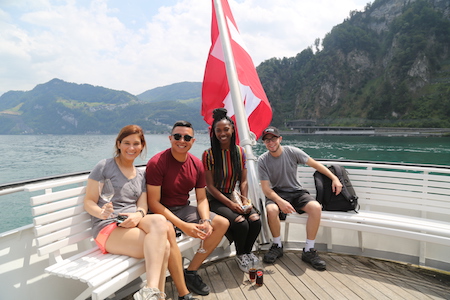
Students participating in IFSE in Zurich, Switzerland. Photo credit: Michal Holland, CPS
At Northeastern University, for example, students enrolled in programs like the MS in Global Studies and International Relations are eligible to participate in the International Field Study Experience program. This 12-week course includes a one-week, on-ground international experience in which students work to solve a real-world issue for an established multinational organization. During this time, students act as international consultants and apply their learning to a practical scenario.
Although this course is offered as a capstone for the Global Studies and International Relations program, all College of Professional Studies students are invited to enroll as an elective to enjoy the benefits of international experience that are widely applicable across disciplines.
Not only are students able to study abroad in grad school, but doing so can have tremendous benefits to your education and your career. Below is a look at the advantages of studying abroad at any stage in your education, but especially at the graduate level.
8 Benefits of Studying Abroad
In an increasingly globalized world, studying abroad is now more important than ever. If you’re considering studying abroad in graduate school, here are eight ways it can benefit your education and career.
1. Improves Your Language Skills
By studying abroad, you’ll have the opportunity to hone your language skills. While studying a language in class is rewarding, applying it to the real world is an entirely different experience. It’s likely you’ll learn the language faster because you’re practicing it regularly. You’ll also be able to pick up conversational language you wouldn’t study in class, enabling you to speak like a local.
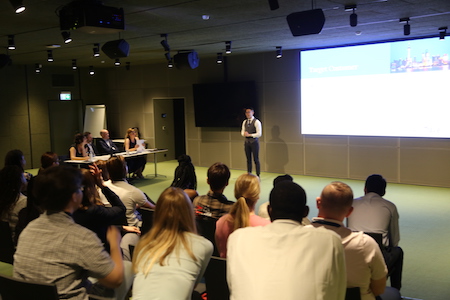
Many careers in international relations and diplomacy also rely heavily on foreign language skills. Although there are no specific language requirements to become a foreign service officer, proficiency and experience with a foreign language is a key component of a candidate’s competitiveness during the selection to become a diplomat , ambassador , or other positions with the United Nations .
2. Exposes You to Different Styles of Teaching
Each country has its own unique style of teaching. Studying abroad can help you expand your academic horizon and develop the capacity to adapt to various educational settings.
Adapting to different styles of teaching can also help you adjust to different management styles, making you more versatile in the workplace. Teaching styles you may encounter abroad include:
- Authority Style: A teacher-centered style where a professor is the authority figure and frequently gives long lectures or one-way presentations. There is a focus on set rules and expectations, and students typically take notes to retain information.
- Facilitator Style: Professors promote self-learning by emphasizing the teacher-student relationship. They help students develop critical thinking skills by teaching them how to ask questions and find solutions through exploration.
- Delegator Style: Professors assign lab activities and give students in-class projects to help them stay engaged. This is a guided learning style that places the teacher in an observer role while helping students remain active participants in their learning.
3. Impresses Employers
Studying abroad can help launch your career and make you more competitive in the workforce. It gives you the opportunity to show future and current employers that you have the open mind, resourcefulness, and drive needed to adapt to a different environment.
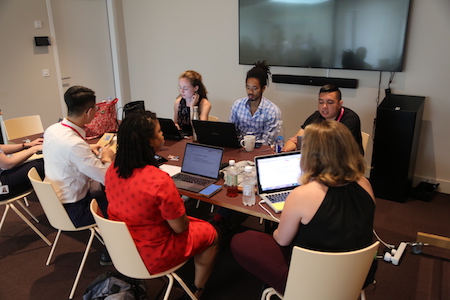
Many employers are looking for graduates who have international experience. According to a survey , 64 percent of employers consider study abroad experience to be important, and 92 percent of employers look for transferable skills that are typically gained from the experience, such as flexibility to new challenges.
“Students who study abroad offer more to the workplace than those who don’t,” Lombardi says. “They offer a fuller package than just a student who’s looked at how things are theoretically, as opposed to students who have the opportunity to apply the concepts in their studies to real jobs and experiences across various cultures.”
Another survey found that nearly 40 percent of companies missed out on international business opportunities due to a lack of personnel with international experience. Studying abroad can be a powerful resumé booster that shows employers that you have the skills they need to achieve their business goals.
4. Enhances Your Network
Studying abroad helps you build invaluable relationships with people from all over the world. You broaden your international connections while having the opportunity to meet people that could turn into life-long friends. Some connections can even lead to career opportunities, including internships, job offers, and business partners.
The university where you study will often have a large community of students from local regions and abroad, giving you the opportunity to meet people from different backgrounds and cultures. The wider your network, the greater the likelihood you’ll be connected to exciting career and social opportunities.
Northeastern’s International Field Study Experience, for instance, allows students to work with established multinational companies on a real global issue that they are facing. Doing so is a unique opportunity to build relationships and expand their global networks.
5. Teaches You About New Cultures and Perspectives
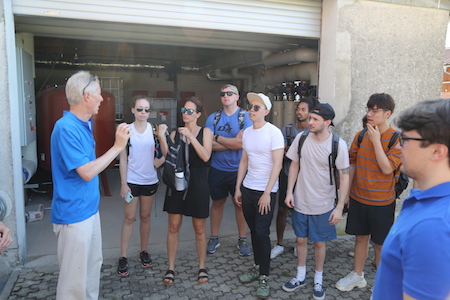
For example, you may work with people from other countries in your next job. By studying abroad, you’ll be more comfortable with people from different backgrounds, value their unique experiences, and establish a stronger relationship with them.
Oftentimes, our cultural background has a huge impact on how we react to different situations. Gaining a variety of perspectives can help you look at experiences in an entirely new way. By studying abroad, you’ll meet people with different upbringings, helping you widen your horizons and broaden your mind.
In addition, the best way to experience another culture is to immerse yourself in it, and the ideal way to do that is by living in another country.
6. Boosts Your Confidence
By immersing yourself in another culture, you develop valuable life skills needed for personal growth, including independence and adaptability. These skills can give you an added boost of confidence in your personal and professional life.
Studying abroad can be overwhelming, but the challenges you overcome can help you become a more mature person. You’ll find out that you can often thrive in new, unexpected circumstances, and you’ll boost your communication skills by speaking a new language—helping you further improve your self-confidence.
“It’s a great opportunity to work on cultural competencies, like being sensitive to other cultures, learning how to adapt to new situations, and tolerating ambiguity,” Lombardi says. “These skills are important to almost any job.”
Quickly adapting to your new environment will hone your self-reliance and resilience. From small tasks, like going to the doctor, to larger issues, like learning how to negotiate with a professor or adapt to a different culture’s management styles, your daily life can help you become a more capable person.
Studying abroad can also help you gain more confidence by improving certain skills that help you connect with others, such as:
- Leadership: Strong leadership and team management skills are important in almost any environment. Knowing how to lead and inspire the people around you can help you establish stronger relationships, whether you’re working on a class project with a group of international students or completing an internship abroad.
- Communication Skills: Strong written, public speaking, and negotiation skills are important to communicating effectively, particularly in an unfamiliar environment like a new country.
- Cross-Cultural Awareness: Our experiences, values, and cultural backgrounds guide our viewpoints and actions. Studying abroad reminds you to be cognizant of others’ perspectives. Remember that what is considered appropriate in one culture can be inappropriate in another.
7. Allows You to See the World

Studying abroad allows you to see the world and travel to new places you would otherwise not have visited. During your time away from your studies, you can go sightseeing in your new city. You’ll also get to know your region more intimately than if you were just visiting for a shorter period of time.
When studying abroad, you can also visit neighboring regions and countries, as you’re not limited to one place. For example, if you’re studying in Milan, you can visit Florence or explore the Tuscan countryside by train. With international budget airlines and travel deals, exploring the world is becoming increasingly more affordable.
Your newfound connections can also show you areas that a tourist otherwise wouldn’t experience.
8. Uncovers New Career Opportunities Abroad
Studying in a new country exposes you to increased career opportunities, depending on your field of study. If you’re interested in finance, for example, consider studying in a region such as London or Hong Kong—two cities well known for business. If you’re interested in tech, then look into Berlin or Tel Aviv.
Oftentimes, organizations hiring international employees want to see evidence that candidates can thrive in a global environment. Studying abroad, especially in an area where you are interested in working, gives you the chance to showcase key skills and relevant experience on your resumé, like cross-cultural communication and an understanding of international policy.
Skills Gained From Studying Abroad
Studying abroad can broaden a student’s academic experience by acquiring various skills that go beyond the classroom, including:
- Provides opportunities to experience foreign cultures, improving one’s ability to work and communicate effectively with people from different backgrounds
- Creates adaptability and resilience as students navigate unfamiliar environments and overcome challenges
- Encourages students to learn independently and manage their daily tasks and responsibilities, giving them critical leadership skills for their future endeavors
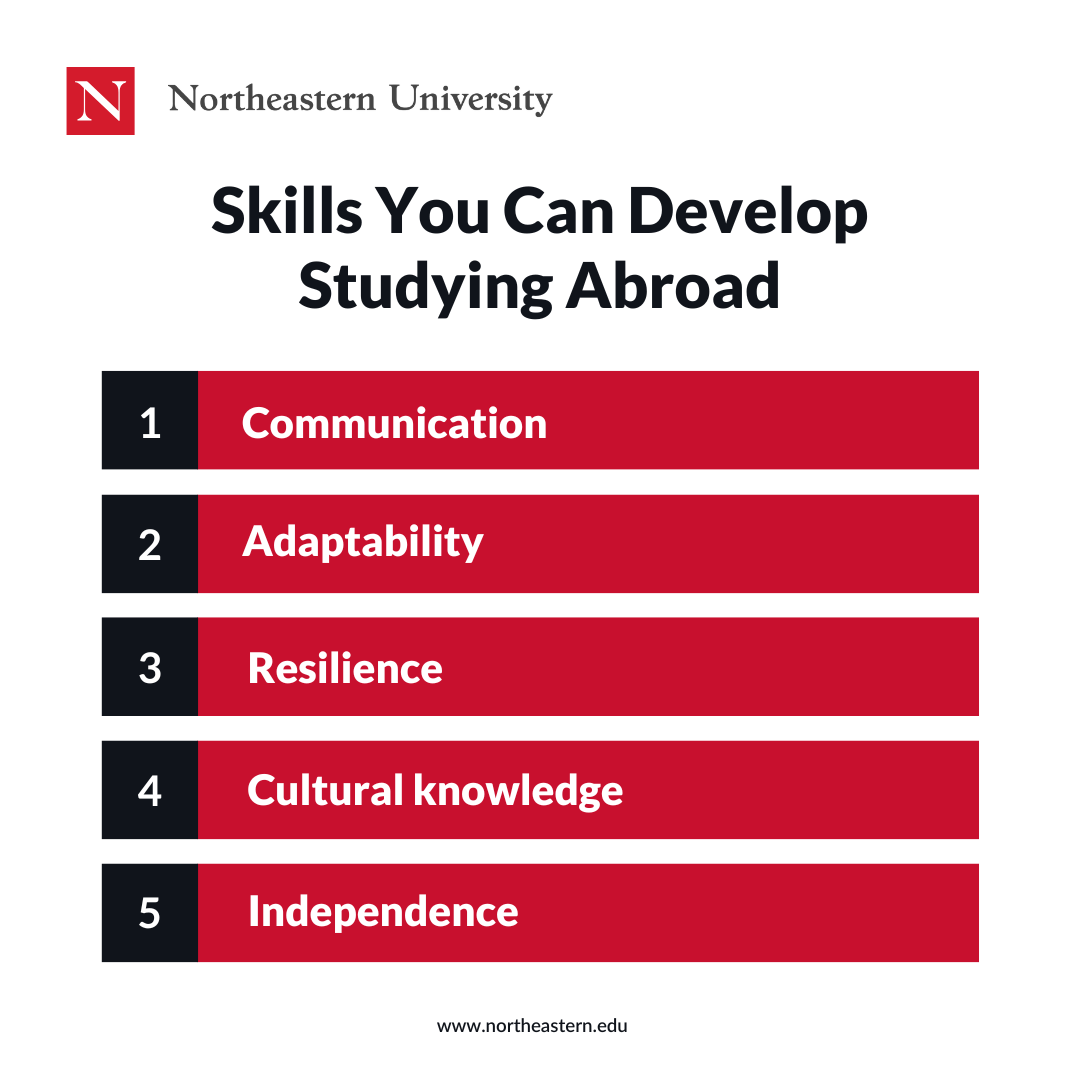
The global perspective gained through studying abroad is an invaluable experience to have in today’s interconnected world, providing a competitive advantage for professionals who take the opportunity during their academic career.
Choosing a Graduate Study Abroad Program
The advantages of studying abroad are tremendous at any stage in your education. But, for those students looking to study abroad at the graduate level, finding the right program to fit their needs can be challenging. It’s important to find a program that will help you meet your goals. If you are balancing work and school, for example, a short-term program may be a better fit for you than a one- or two-semester trip.
For those pursuing a Master of Science in Global Studies and International Relations , for example, Northeastern’s International Field Study Experience is designed to give students the experience they need for a global career .
“Our International Field Study Experience offers an experiential learning opportunity matching students with international organizations,” Lombardi says. “It’s truly an immersive program where you have the opportunity to learn about the culture and work with an industry partner. You are learning about different cultures and gaining work experience at the same time.”
In addition to career-specific benefits, Northeastern’s program also fosters personal development. International education promotes global learning, fosters understanding among groups from diverse backgrounds and perspectives, and develops globally-minded individuals.
“Being able to take all of what we’re learning, focus it in the classroom, and apply it out into the field and world is amazing,” Lombardi says. “All students should take advantage of this incredible opportunity.
To learn more about advancing your global career, download the free guide to breaking into Global Studies and International Relations below.
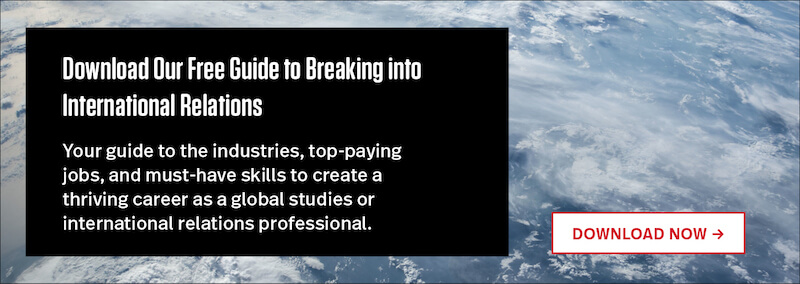
Subscribe below to receive future content from the Graduate Programs Blog.
About tamar shulsinger, related articles.
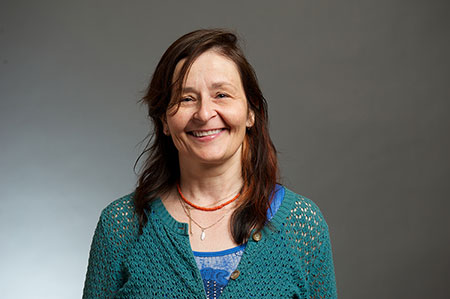
How You Can Use Geographic Information Technology

5 Reasons to Study International Relations and Diplomacy

Master’s Lands Alum Role with the Dept. of Homeland Security
Did you know.
The average mid-career salary for international relations majors is $92.9K. (OneClass, 2018)
Master of Science in Global Studies and International Relations
A degree that will put you on the world map.
Most Popular:
Tips for taking online classes: 8 strategies for success, public health careers: what can you do with an mph, 7 international business careers that are in high demand, edd vs. phd in education: what’s the difference, 7 must-have skills for data analysts, in-demand biotechnology careers shaping our future, the benefits of online learning: 8 advantages of online degrees, how to write a statement of purpose for graduate school, the best of our graduate blog—right to your inbox.
Stay up to date on our latest posts and university events. Plus receive relevant career tips and grad school advice.
By providing us with your email, you agree to the terms of our Privacy Policy and Terms of Service.
Keep Reading:

The 8 Highest-Paying Master’s Degrees in 2024

Graduate School Application Tips & Advice

How To Get a Job in Emergency Management

Join Us at Northeastern’s Virtual Graduate Open House | March 5–7, 2024

- How to Apply for A PhD Abroad – International Study
- Applying to a PhD
So you’ve decided to enrol onto a doctoral degree and study abroad at the same time. This is a great opportunity to develop yourself both personally and academically. However, do you actually go about securing a PhD as an international student? To help answer this for you, we’ve created this guide to explain how to apply for a PhD in foreign universities.
Why Do Your PhD Abroad?
There are many benefits to studying abroad.
Some PhD students do so as a way to develop a new language, discover more about a different culture, and to meet new people.
Besides personal reasons, undertaking a doctorate degree abroad can also for academic purposes. For example, in some countries, a particular research field may not be very popular and so there may not be many doctorate options available. In these cases, undertaking a PhD abroad will open up many more opportunities. It could also offer greater funding, lower tuition fees, better laboratory equipment and more experienced supervisors. Not only would these factors result in a more enjoyable PhD, but they could also contribute to greater career prospects. For example, you will likely have more opportunities to write publications, attend conferences and collaborate with other researchers. All of these will help you establish yourself as a respectable researcher within your field.
Is It Difficult to Apply to PhDs Abroad?
It’s not as difficult as you would imagine when it comes to applying to a PhD in a foreign country. Regardless of whether you’re applying to a university within the EU, such as the UK, Finland or Spain, or to universities within the US or Asia, the processes are relatively similar.
The differences in the application process can be categorised into three areas.
- the documents you need to provide,
- the prerequisite tests you need to sit,
- how much you need to communicate with the potential supervisors before applying.
We’ve provided a basic outline of the application processes below. Although this will provide you with a good starting point, we highly recommend you look at the university websites for specific instructions and guidance before applying.
Will I Need a Student Visa?
This will depend on what country you are applying to. For example:
- In the UK, applicants from outside the EU will need a Visa Tier 4 (Student). This will allow them to undertake a full-time PhD. However, due to UK visa restrictions, international students are unlikely to be able to enrol onto a part-time degree.
- In Germany, most students will not require a student visa but will require a residence permit.
- In the US, applicants will need to hold an F-1 Student Visa.
- In Asia, the requirements differ depending on the specific country. For example, in China, you will require an X1 Student Visa whereas in Singapore you will require a Student Pass.
Because of the significant differences between countries, we highly recommend it is highly that you check the requirements on an individual case-by-case basis. This is best done by checking the government website of the country you wish to apply to.
General Process for Applying to PhDs Abroad
When applying to a PhD position, most universities regardless of where they’re located will require:
- Online Application – An electronic form to provide your details and attach all supporting documents. You will also need to make any application fees during this process if required.
- Academic Transcripts – Most universities need a scanned copy of your transcripts when applying. You will only have to submit official hard copies once they have accepted your admission.
- CV – This should include details of your previous education, undergraduate degree and any experiences revenant to the field you’re applying to.
- Statement of Purpose/Personal Statement – A letter which outlines why you’re applying to the PhD and why you believe you’re suitable for the project.
- Letters of Recommendation – this should preferably be provided by your undergraduate degree course tutor or a professor who knows you well.
Language Tests
If your PhD is to be undertaken in English and English isn’t your first language, most universities will require you to sit an English language proficiency test. The most common tests, in order of popularity, are:
- IELTS (International English Language Testing Systems)
- TOEFL (Test of English as a Foreign Language)
- PTE (Pearson Test of English)
The minimum test scores will change from university to university. They will also vary depending on the research field. For example, research projects related to English Literature or Law will require relatively high scores whilst projects in Science and Engineering will require slightly lower scores. To provide an example, the University of Leicester in the UK requires a minimum overall IELTS score of 7 for Law PhDs but has a lower overall score requirement of 6 for Engineering PhDs.
Finding a PhD has never been this easy – search for a PhD by keyword, location or academic area of interest.
How to Apply for PhDs in EU Countries
For UK universities, there are generally two ways of applying. You can either apply directly through the university’s website or you can make an application through the UCAS Postgraduate system .
In Spain, Italy and Germany, before applying to a PhD you will first need to pass a pre-application process. This involves checking that your qualifications meet their eligibility requirements. Before undergoing this pre-screening process, it would be beneficial to first speak to your government. They may offer advice on how your countries qualification system corresponds to the qualification system in the country hosting the PhD.
Once you’ve made your application, the university will review it and get in contact with you. For most EU institutions, they will invite you for a Skype or telephone interview with them if they believe you may be a suitable candidate.
If you require a student visa to study in an EU country, it’s recommended that you submit your application at least 3-4 months before the proposed PhD start date.
How to Apply for PhDs in USA
In addition to the English language exams mentioned previously, international applicants will also need to sit additional exams to be eligible for PhDs in the USA. These are the GRE General Exam and GRE Subject Exam(s). The GRE Subject Exam(s) you will need to undertake will be specific to your field and will be specified by the university as part of their edibility requirements.
Securing a PhD position in the United States is considered relatively difficult compared to other countries. As a result, it is commonly recommended that you apply to at least 9 different universities to increase your chances of securing a position.
How to Apply for PhDs in Asia
As Asia covers a wide range of countries such as China, Hong Kong, Singapore, South Korea, UAE and India, their application processes naturally differ from one another. Therefore, check the specific application process for each university you’re interested to get the most accurate information.
To summarise:
- China – uses two centralised application services, CUAC and CUCAS. Both these services help international students find and apply to a PhD project in China. Students can also apply directly to a University if they wish to.
- Singapore – rather than applying to a specific research project, you will have to apply to a faculty or department within a University. Only once you have been accepted into the university department will their research projects become available to you. Like US universities, most universities in Singapore will have required you to have sat a GRE Exams prior to applying to them.
- UAE – you must apply directly to your chosen university. To be eligible for a PhD in UAE, you must hold a Master’s degree and it must be from a university recognised by their government. You will also be required to undertake GRE Exams before making your application.
How to Apply for PhDs in Australia
To apply to a PhD in Australia, you will first be expected to find and email a potential supervisor. If you’re an international student and you make an application directly to the university without doing this first, it’s highly likely that you won’t be considered for the position.
Upon discussing the project with the supervisor, they will instruct you to put in a formal application. This formal application will require the information previously outlined above.
Similar to EU institutions, if an Australian university believes you’re a strong candidate, they will likely invite you to a Skype or telephone interview.
Unlike EU universities, PhDs in Australian universities can start at any time of the year. Therefore, unless a specific funding requirement is attached to the project, there are usually no deadlines associated with applying to their PhDs. However, try to apply 3 to 4 months before you intend to start your studies.
Browse PhDs Now
Join thousands of students.
Join thousands of other students and stay up to date with the latest PhD programmes, funding opportunities and advice.
- Skip to main content
- All Articles
- Study abroad info Articles
- Study abroad info Subject guides
- Choosing where to study
- Applying to a university
- Financing your studies
- Getting your visa
- Before you leave
- Housing & accommodation
- Once you arrive
- Post-study life
How to prepare to study a PhD
Studying for a PhD represents is the highest level of academic study. Requiring hard work and dedication it's a big decision to study at a doctoral level. We explore how to prepare and what you can expect.

Studying for a PhD represents the highest level of academic study that you can pursue. It is a unique opportunity to research independently and make an original contribution to the subject and field you are involved in. A PhD is quite different from other postgraduate degrees, requiring additional skills, knowledge and insight. We’re here to help you with some tips on preparing for a PhD, what you’ll need, what you can study, and how a PhD can help or shape your career.
What is a PhD?
A PhD is a research-driven degree and the highest academic qualification you can obtain. PhD candidates need to undertake in-depth research and positively contribute to the body of knowledge in a subject specialisation. A PhD is different from almost all other degrees as there are generally no taught components. A PhD usually takes between three and four years to complete full-time, while part-time up to seven years.
As a PhD student, you will submit a final thesis and dissertation, which is assessed by a panel of examiners who decide whether the work warrants the award of a doctoral degree. A PhD may also have no mark attached to it and is awarded as either a pass or fail. If you pass your PhD, you get a Doctor of Philosophy qualification and the title of Doctor, although this is usually only used in academic settings.
Why study for a PhD?
A PhD is a significant investment of time and money. You must be interested in the subject or area of specialisation you intend to research. You should also have an affinity for academic research and inquiry. Additionally, you’ll be motivated to contribute to a field and develop your expertise. Some of the reasons why students decide to study for a PhD are:
- To gain invaluable skills
- To improve career prospects
- To develop knowledge and understanding
- To uncover unique insights and perspectives
- To translate research into practical implementation
- For personal development
Every student may have different motivations for pursuing a PhD, so it’s always advised that you speak with a prospective supervisor or the academic office at a university to assess your suitability. This can be assessing your specialist area or whether a PhD aligns with your personal and professional goals.
What does studying for a PhD involve?
For a PhD, you will initially have to submit a proposal or outline of your proposed research. This will list the hypothesis, theories, methodology and scope for your research. If accepted onto a PhD programme, you can use this as the blueprint for your dissertation and thesis. Depending on your subject area, you may need to conduct in-person interviews, focus groups, laboratory work and fieldwork as part of your studies.
Studying for a PhD will involve a lot of reading, testing, writing and research. Don’t worry, you won’t have to do it all alone. On a PhD programme, you can usually interact with other doctoral students at seminars and workshops. In addition, you will have an appointed supervisor , who is usually an expert in the field, helping you refine ideas and supporting you.
One of the most important skills you must master as a PhD student is time management. You will be balancing many competing priorities, so having a clear schedule and plan can help significantly. You will find yourself multitasking and trying to meet deadlines regularly.
Read more about the international student experience abroad.
What challenges do PhD students face?
Preparation for a PhD is essential. You must honestly assess some of the challenges and obstacles you could face to navigate these successfully. You’ll be working hard and maintaining high academic standards , which can be stressful. Additionally, a PhD can mean working and researching independently, which can be isolating and lonely. Don’t be afraid to request academic support or speak with your supervisor about this.
Due to the length of a PhD, you will also find that your motivation levels may change. This is completely normal, and you shouldn’t worry too much about it unless it affects your day-to-day life and ability to meet deadlines. Perseverance is key, and if you need to speak with a counsellor or someone you trust to get support , always do so.
Another challenge some PhD students will face relates to funding . Tuition fees and additional costs will add up over time, so finding a form of funding, such as a loan or scholarship can be very useful. If you are paying for the degree yourself, this may involve you working a full-time job or doing part-time work. Always check that you can work in the destination you want to study in and make a comprehensive budget, including all living costs and expenses .
Discover more about looking after your mental health as a student.
Tips for preparing for a PhD
Preparing for PhD study involves several key steps. You will need to decide on your research topic and area of specialisation. You must also check if your prospective university has a supervisor who is suitably qualified in the area. In addition, some other valuable steps you can take to get ready for doctoral studies include:
- Reading articles, books, and journals related to your topic of interest
- Finding out what the entry requirements are
- Researching the application procedure
- Asking your current lecturers for their advice on studying for a PhD
- Look into how to write a research proposal
- Undertake any English language tests if necessary
- Decide on your references (people who know you in an academic context)
Discover more about how universities verify overseas qualifications .
Will a PhD help my career?
The answer to this question depends on the specialisation you are studying. First and foremost, a PhD is an academic rather than a professional degree , so the direct connection with career progression may not be readily apparent. However, in STEM fields such as medicine, engineering, healthcare, and even technology, a PhD can positively impact your career trajectory.
A PhD will also equip you with several transferable skills . These include key competencies such as:
- Information synthesis
- Writing
- Research
- Presenting
- Interviewing
- Communication
Some PhD graduates go on to teach and work at universities, becoming lecturers and potentially professors. If you wish to work in higher education in this capacity, a PhD is usually a pre-requisite.
Hopefully, you now feel more prepared to take on a PhD. If you're looking to do some more research, you may like our guides to postgraduate study , preparing for postgraduate study , and the top postgraduate degrees for international students.

Why study law: Top 10 benefits of becoming a lawyer
What do Margaret Thatcher, Benazir Bhutto, Barack Obama and Mahatma Gandhi have in common? Interestingly, they are world leaders who studied law. One of the oldest academic fields in the world, a law degree is a highly regarded qualification and promises great career opportunities. For some, to study law is to uphold justice, a noble call that is most commendable (and the world needs more of them); nevertheless, law is not just for lawyers or in the

What is a pre-masters course?
If you have had your eye on studying a postgraduate qualification, and particularly a master’s degree you would have encountered pre-master’s programmes in your research. Sometimes it’s not always easy to understand the differences between the qualifications and courses on offer and why you would apply or enrol for a pre-master’s programme. We take a closer look at pre-master’s courses and programmes, demystifying the details. What is a

MA vs MSc: What is the best choice?
If you’ve been considering studying for a master’s degree, you would likely have come across a few different options. This can initially seem confusing. You may think that the degrees are pretty much the same. However, there are some key differences between two of the most popular master’s qualifications, namely an MA and an MSc. In this article, we explain what these degrees are, what it takes to study them and what careers they can lead to.

What are professional degrees?
When researching your study abroad options you’ve probably come across degrees and qualifications described as professional degrees. You may not be sure what makes these programmes and courses different from those described as academic degrees. Perhaps you’re wondering what impact studying for a professional degree will have on your career. We can help by guiding you through what professional degrees are, the specialisations you can study, and some careers you can

Get in touch

Six Ways to Go Abroad as a Postgrad
Posted in News Story
Because of restrictions related to the ongoing COVID-19 pandemic, students worldwide have missed out on certain aspects of the college experience and have had to adapt to new ways of learning. Many Georgetown students’ original study abroad plans may have been interrupted during Fall 2020 or cancelled in subsequent terms. As vaccines are rolled out in more countries, restrictions on travel and visas will hopefully begin to open up. Whether your study abroad plans were impacted by COVID-19, you missed the chance during undergrad, or you just want to continue to build upon your prior experience, you may be considering alternative ways to spend time abroad after graduation or in the future. Though OGE focuses on undergraduate credit-bearing study abroad, we wanted to take this moment to point interested students in the direction of other opportunities to go abroad and the corresponding resources available to Georgetown students.

Graduate School
Study abroad as a grad student: Some graduate programs in the United States have an option to spend a semester, year, or shorter term abroad. If you’re thinking about going to grad school, you may wish to include this as a consideration in your search for a program.
Earn a graduate degree abroad: You may wish to pursue your graduate degree at a university abroad. Many graduate schools in the UK, the EU, Australia, New Zealand, and Latin America are accessible to American students. Some of the universities Georgetown partners with for undergraduate study abroad also offer graduate programs; you can use the Program Explore tab on our website to find universities in countries and cities where you may be interested in studying. If you already studied abroad at a particular school, you may be particularly competitive for admission to graduate programs there or may qualify for a scholarship, but if you didn’t get a chance to study abroad there are many opportunities for you. Be sure to research top programs for your academic area of interest and talk to faculty from your area of study. As an additional benefit, getting your graduate degree abroad may be less expensive, as graduate programs abroad may be completed in fewer months than programs in the United States, and international universities may not always require standardized tests like the GRE. Additionally, some overseas universities qualify for federal financial aid and loans through FAFSA. To find out which programs may qualify, visit the FAFSA website . There are also many scholarship opportunities available for students pursuing a graduate degree abroad!
Fellowships, Internships, or Research Positions
Participating in a fellowship is a valuable way to continue your education while gaining professional and/or research experience. Fellowships can also provide an opportunity to live in another place for a fixed amount of time, similar to study abroad. While not all fellowships take place abroad, there are plenty that do. To find one you’re interested in, talk to Georgetown’s Center for Research and Fellowships and use their site to begin your own research!
Some fellowships that take place abroad include:
The Fulbright Program
Critical Language Scholarship
Gates Cambridge Scholarship
Humanity in Action Program
Princeton in Africa, Asia, or Latin America
DAAD Fellowships and Scholarships
Teaching English Abroad
One option is to teach english as a second language in a foreign country. Through the TEFL (Teaching English as a Foreign Language) program, you can become certified to teach English as a second language. This can be a good way to live abroad while earning some money, being a part of a community, and making a meaningful impact on your host town. The TEFL website also has a job search function where you can find TEFL opportunities around the world. You can expand your job opportunities and earning power by becoming TEFL certified. Consider Georgetown’s TEFL certification program at the English Language Center. CIEE , one of Georgetown’s study abroad partners, offers programs for teaching English abroad that include on site support and placement assistance; CIEE participants can also add TEFL certification training to their program for an additional fee.
In addition to TEFL programs, organizations and government supported English teaching programs are excellent opportunities to teach English in another country while earning a stipend or salary. Some of these programs include: JET , TAPIF , TaLK , EPIK , and USTA Austria .
Service Opportunities
Postgraduate service is a way to volunteer abroad and serve communities in need. Participants usually commit to spend one or two years at their post, performing either a specific task or engaging in general services to aid the community. Most of these programs give volunteers a stipend for living expenses. There are many types of service opportunities – government-run, faith-based, and independent – so with some research, you will definitely be able to find one that’s right for you. You can use this database of programs to find one that suits your interests.
Georgetown’s Center for Social Justice has more information about these kinds of opportunities. If you’re interested in doing postgrad service, set up a meeting with the CSJ to discuss opportunities based on your preferences.
If you want to live or travel internationally as a professional, talk to the Cawley Career Center to learn more about international job opportunities and find the right path for you. As you think about your goals, consider fields or industries that have locations in other countries or that may require international travel. Some companies may even offer rotation programs that include overseas placements.
Working holiday visa
Once travel and visa restrictions are lifted, an option to consider is the working holiday visa. These special temporary visas allow people under the age of 30-35 to work and travel abroad for a limited period of time. US citizens may be able to obtain working holiday visas in Singapore, South Korea, Ireland, Australia, and New Zealand. Working holiday visas usually last between 6 and 12 months, and don’t require you to keep the same job the entire time, allowing you to travel around during your period of residence.
There are many ways to live, study, or work abroad independent of an undergraduate study abroad program. Though no experience is quite the same as studying abroad, these options allow you to meet new people, gain international experience, and immerse yourself in a different culture.
- Prospective Students
- International Relations
- Doctoral Studies
- Habilitation (Postdoctoral Thesis)
- Faculty 03 Social Siences
- Postgraduates
Abroad during the PhD
- Information for Incomings
- Information for Outgoings
- General Information
- Invite Postgraduates from Abroad
- Staff Mobility
- Internships Abroad
- Partner Universities
- Green Exchange
How to go abroad during your dissertation?
Similar to undergraduate or graduate students, doctoral candidates can also spend a sponsored stay abroad at one of the partner universities of the Faculty of Social Sciences via the ERASMUS program. All universities, which marked with the addition “PhD“ in the list of our partners, have already existing contracts. If you are interested to new agreements, please contact the Department of International Affairs at the faculty.
In order to go abroad with the ERASMUS doctoral student mobility, you should - for example through already existing personal contacts of your chair - make a corresponding inquiry to your desired partner university. Following an informal invitation or confirmation from the partner university, the nomination is made by the ERASMUS Coordination of the Faculty of Social Sciences.
Since the application process for ERASMUS doctoral student mobility is carried out in the same way as for students, please follow these instructions .

Research Stay trough Erasmus Traineeship Mobility
Doctoral students also have the opportunity to conduct an Erasmus-funded research stay as an internship in a research institution, university or company. The same conditions apply as for student internships. Doctoral students can also receive a grant as graduates up to one year after the end of the doctoral program (date of exmatriculation).
The Erasmus scholarship is usually not sufficient for a full financing of the stay. You may be eligible for support from the receiving institution (free accommodation, internship fee, etc.). You can also combine the Erasmus scholarship with other scholarships, unless they come from an EU funding scheme.

Further Funding Possibilities
In addition to funding through the ERASMUS program, there are many other ways to support a stay abroad during the doctoral studies. For example, the German Academic Exchange Service (DAAD) offers both a one-year scholarship for doctoral students and corresponding short-term fellowships .
The Fulbright Commission promotes 4 to 6-month stays in the USA by young German scientists. In addition to study grants, the Begabtenförderungswerke offer doctoral scholarships, which in many cases also promote stays abroad. Further funding opportunities are offered, for example, by the Deutsch-Französischen Doktorandenkollegs /German-French Doctoral College, the European University Institute or the Japan Society for the Promotion of Science .
In addition to the examples presented here, there are numerous other funding opportunities for doctoral studies abroad. The Department of International Affairs at the Faculty of Social Sciences will gladly assist you in your selection.

Credits (top to bottom): DAAD; Goethe-Universität Frankfurt (2x).
International Relations Management and Erasmus+-Coordination Dr. Anke Reinhold
Tel.: +49 (0)69 798-36571 E-Mail: [email protected] PEG Room 2G. 134
Open consultation hours: Tuesdays and Thursdays 11 am – 1 pm and online by appointment via email to [email protected] .
During the semester break, office hours are held on Tuesdays from 11 am – 1 pm.
Goethe University Faculty of Social Sciences Campus Westend, PEG building Theodor-W.-Adorno-Platz 6 60323 Frankfurt am Main
- © 2004-2024 Goethe University Frankfurt/Main
- Privacy Policy
- Cookie Settings

- Studying at Goethe University
- International applicants
- Overview of study programmes
- Programme for refugees
- Goethe Business School (continuing education)
- Research at Goethe University
- Scientific news
- Goethe Welcome Center (for international researchers)
- Collaborative research projects
- Individual research
- Visiting fellowships
- Endowed chairs
- About the University
- News-in-brief
- University administration
- Campus locations
- Campus life
- University archives (German)
- Rhine-Main-Universities
- Campuservice (host your event on campus)
- Jobs at Goethe University
- Job board for companies
- University Library
- Student Life
- Life in Frankfurt
- University Sport Centre
- Job Boards (German)
- Cafeteria menus
- Studentenwerk student services
The Unexpected Benefits of Doing a PhD Abroad
While there’s initially something exciting and intriguing about the idea of moving to a new country to do a PhD, reality can settle in fast. You might find yourself worrying about what it would actually mean to be so far from home for so long, or if it would be hard to navigate a different academic system and adjust to a new place. Suddenly, you’re talking yourself out of doing a PhD abroad before you’ve even really started to consider it.
But there are also so many benefits to doing a PhD abroad, from both a career and a personal development standpoint, that make it worth considering. Whether you’re thinking about doing a postdoc after, or you want to gain some professional experience, a PhD abroad can have a very positive impact long-term. Here’s why:
A global network of contacts
Doing your PhD abroad allows you to expand your network outside of your home country and institution.Having a solid network allows you to gain access to different projects, work experience, and research opportunities that can enhance your own work. Whether you choose to move again after your PhD, or come back home, having a global network is extremely important for accessing these opportunities.
Professors and supervisors also move around a lot, especially in Europe researchers are generally more mobile. Doing a PhD abroad allows you to build a global network that you can leverage during your degree and for years after.
Unexpected opportunities
Like networking, doing a PhD abroad opens you up to a lot of different paths. It can help you develop your research interests further, and find projects you’re passionate about that you may not have found otherwise. By going abroad, you’ve already opened yourself up to a completely new experience, and it ends up snowballing into more. The more you express yourself and your passions to your supervisor and other faculty, the better the chances are that different opportunities will arise as you progress through your degree.
Soft skills training
By deciding to move abroad, you demonstrate that you’re determined, open to new things, and ready to jump into new situations. But as you progress through your degree, you’ll gain an understanding of different systems and work cultures that you might not have experienced if you’d stayed in your home country. These are incredibly important soft skills that you’ll need after your degree, no matter what path you choose. Doing a PhD abroad is evidence of your passion, flexibility, and willingness to adapt to new systems and people - key skills that universities and employers seek out.
Developing a better understanding of different research methods and systems
A PhD is a key step in your personal development as a researcher. Going abroad can give you insight into a different world that can be extremely beneficial for your own research and how you approach your work. Studying internationally gives you opportunities to explore different research methods, discover innovations in the fields, and experience first hand how different academic systems actually work.
For some, this might all sound daunting. If you’re one of them, use this as a chance to work past your fears and give yourself a new perspective on your research and the broader academic systems you want to be a part of.
There are so many benefits to doing a PhD abroad, both practical and personal. It can be a great way to balance academia with a sense of adventure and really understand your own capabilities. If you use the time to better understand and adapt to the nuances of a different culture, you’ll find a new realm of possibilities. As you start to adjust, work through new situations, and improvise solutions during your degree, you’ll see yourself grow. You’ll find that you have become more adept at problem-solving and thinking on your feet - always good qualities to highlight in future applications. Doing a PhD abroad is what helps you get to that point and you’ll find yourself immersed in the experience.
Discover related jobs
Discover similar employers
Accelerate your academic career
Everything You Need to Know About the GRE
Depending on where you plan to apply for graduate school, you may have t...
Potential Red Flags to Consider When Choosing a PhD Supervisor
Here are some potential red flags you should keep an eye out for during ...
Preparing for Your PhD Defence
Here are some tips to help you beat the nerves and rock your defence.
Overcoming Impostor Syndrome
Impostor syndrome is a nagging feeling of self-doubt and unworthiness th...
German Academic Job Titles Explained
German job titles are slightly different from their American equivalents...
So You’re Defending Your Dissertation Tomorrow
One of the best things you can do today to prepare for your defence is t...
Jobs by field
- Machine Learning 177
- Electrical Engineering 167
- Artificial Intelligence 166
- Programming Languages 141
- Molecular Biology 119
- Materials Chemistry 103
- Electronics 100
- Cell Biology 97
- Mechanical Engineering 94
- Materials Engineering 91
Jobs by type
- Postdoc 323
- Assistant / Associate Professor 174
- Researcher 131
- Professor 128
- Research assistant 92
- Lecturer / Senior Lecturer 82
- Engineer 56
- Tenure Track 51
- Management / Leadership 50
Jobs by country
- Belgium 267
- Netherlands 171
- Switzerland 126
- United Kingdom 46
Jobs by employer
- Mohammed VI Polytechnic Unive... 99
- KU Leuven 92
- Ghent University 70
- ETH Zürich 69
- Eindhoven University of Techn... 54
- University of Luxembourg 44
- KTH Royal Institute of Techno... 44
- University of Twente 40
- Manchester Metropolitan Unive... 38
This website uses cookies

- Degree Abroad
PhD Programs Abroad
+ ADD COUNTRY FILTER
+ ADD DEGREE COURSE FILTER
Remove filter
4 Doctorate Degree Programs Abroad
Browse programs that match your interests

Top Provider of the Month
Launch your culinary career in florence, tuscany with sai study abroad with sai programs.
0 0 reviews
EU Doctor of Business Administration (DBA) Program
Sharpen your academic, leadership, and managerial competencies with the highly competitive DBA program of EU Business School. Challenging and rigorous, this doctoral degree aims to develop your critical and independent thinking skills, enabling you to master a specific busines...
EU Business School
UWI Cave Hill PhD in Cultural Studies
This course is for creative people. It encourages critical thinking and explores topics of debate in various disciplines, with a strong emphasis placed on topics that drive our civilization. Courses tackle issues in the history of aesthetics as well as the philosophy of art an...
University of the West Indies Cave Hill
Medicine at Poznan University of Medical Sciences in Poland
The 6-year MD program at PUMS is designed for undergraduate applicants. It leads to a professional degree of Doctor of Medicine and opens doors to medical licensing on all continents.Our high standards of teaching are in line with American, European, and other international re...
Poznan University of Medical Sciences
Other Programs You Might Like

Want to Get Matched with Programs?
Video of the month.
Study abroad in Rome, Italy at John Cabot University! John Cabot University Learn More

A Guide to PhD Programs Abroad
Earning a PhD is something that few people wish to accomplish, and even fewer actually do. If you thought your bachelor’s or master’s degree programs were tough, gear up! Your schedule will be filled with early lectures, late night research, and countless presentations during nearly any PhD program. Even with all this coursework ahead of you, earning your PhD abroad might seem completely out of the question, but think again! Education is a global stage and universities everywhere have doctorate degrees, and each region, country, or PhD program offers a little something different to make your education that much more interesting.
Why Earn a PhD Abroad
The better question is, “Why not earn your doctorate degree abroad?” Pursuing your doctorate degree is an opportunity to learn and study on a higher academic level, and grow as a person. Now, if you combine those scholarly activities in a new land, who knows what the outcome may be? Just kidding, it will be great of course!
Completing a PhD abroad will give you a broader international perspective. Not only will your peers and faculty be from different corners of the globe, but you will also have access to resources and facilities that will affect your studies. By traveling in a foreign land, potentially learning how to speak a new language, and witnessing new perspectives you’ll learn just as much in the classroom as you will out of it.
Education is a universal pillar in human civilization and it transcends all borders. You can literally complete doctorate degrees anywhere in the world, but each region has its own appeal in terms of academics. New York City, in the United States, is attractive for entertainment, media, and Wall Street, while major European cities are steeped in history, philosophy, and art and Asia is thriving in economics and foreign languages. Last, but not least, South America is attractive for politics, environmental studies, and anthropology.
Participate in hands-on research in Saudi Arabia along the shores of the Dead Sea in Jeddah at pristine university campuses between the big city and the beach. Saudi Arabia has seen major growth in higher education, especially since the early 2000s. As a major player in the Middle East, it’s a fascinating location for history and theology students specifically. Religion does play a rather large role in education in Saudi Arabia, so even students working on STEM doctorate degrees, whether in engineering, mathematics, or biomedical sciences, can expect to take a couple religion and history courses to round out their curriculum. Though the official language in Saudi is Arabic, you will be able to earn a doctorate degree in English, but it never hurts to learn some key words and phrases.
The United Kingdom’s involvement in the history of Western civilization and the development of modern day banking makes it a prime location for doctorate degree programs. With the recent changes in politics and commitment to the EU, studying accounting, law, and economics would run parallel with life across the pond. The United Kingdom offers no language barrier for English speakers and is considered the doorway to Europe. PhD students can island hop between England, Ireland, and Scotland with ease, then jet over to continental Europe with no worries at all. Many historical and famous universities are located all in the UK, including Queen’s University Belfast. Cities like Manchester and London will offer a great combination of big city living and prestigious doctorate degree programs.
Japan is the world’s third largest economy and with its unique history with China and the rest of Asia, global economics and history enthusiasts will find no shortage of interesting material to build their doctorate thesis around. Japanese is the official language spoken in Japan, naturally, but English comes in a close second, so you’ll be able to complete PhD programs in either tongue. Japan is known for its busy cities, including Tokyo and Kyoto, but don’t forget this nation is filled with 2,000 years of history and plenty of grasslands and mountains too.
Doctorate Degree Programs
Before you send off your applications for your desired PhD programs, consider the following things that you might need take time to prepare:
- A statement of purpose
- Your university transcripts (undergraduate and/or graduate)
- GRE/GMAT Test results
- TOEFL score of 6.0 or higher for English taught programs
- Three letters of recommendation
- Three to four years of academic research or involvement
There are two major ways to earn a doctorate degree abroad; you can apply for a full-time PhD programs directly through a foreign university or you can apply for an exchange program to study abroad for as short as a summer session or as long as a year.
It will generally take about three years to earn your doctorate degree abroad. Your semesters of coursework will build toward your final dissertation, which is an in-depth research presentation that will discuss, analyze, and support a theory you select with the university’s approval. Summers will still belong to you during most doctorate degrees, so you can use this time to get some extra work done to get ahead for the next semester, or take it easy and catch up on traveling. You could also spend the summer at a new location digging deeper into your research and PhD studies.
After you spend your hard earned money and three to four years of your life earning a PhD abroad, then comes the question, “Where are you going to work?” Doctorate degrees will open doors in the following fields, among others, government, consulting, academia, health, finance, law, and the nonprofit sector.
Benefits & Challenges
There are pros and cons for every decision in life, so get your list together and start weighing your options for doctoral degree programs abroad.
Pros. Earning your doctorate degree abroad will give you a great opportunity to travel and apply your studies outside the classroom in a new cultural context. This will broaden your scope as a person and the scope of your research. You’ll expand your network during your PhD program and doors will open to more long-term opportunities to live and work abroad.
Cons. You might not jive with the country and the local culture, and this will reflect poorly on your coursework. The culture shock and language barrier you may experience could make it difficult to make friends, and it will take some time to adjust to daily life in a new country. Also consider the cultural differences in academia and higher education that you’ll face during PhD programs abroad.
So, should I stay or should I go? This will be the biggest question to consider when deciding whether or not to get your PhD abroad. Even if you put together a comprehensive pros and cons list, both sides hold great arguments. If you want to stay home in a familiar place or city, stay. But, you could really take your experiences to another level by pursuing doctorate degrees abroad instead. In the end, the choice is yours, if there’s still really a choice (hint hint: just go ahead and get your doctorate degree abroad!).

Get 1 eSIM that covers over 50 destinations. Starts at 1USD for 1GB!

Popular Searches
Here are some popular links curated for you
- Computer Science & IT
- Undergraduate
- Czech Republic
Travel Tools
Hand-picked travel resources for you
Related Degree Abroad Articles
Read more tips before you travel
10 Best Places to Get Your Masters in the Americas in 2018
The world's best countries to earn your masters abroad in 2018, applying for university abroad here’s how to do it right, for travelers, travel resources, for partners.

© Copyright 1998 - 2024 GoAbroad.com ®
- Study Abroad
- Volunteer Abroad
- Intern Abroad
- Teach Abroad
- TEFL Courses
- Degrees Abroad
- High School Abroad
- Language Schools
- Adventure Travel
- Jobs Abroad
- Online Study Abroad
- Online Volunteer Programs
- Online Internships
- Online Language Courses
- Online Teaching Jobs
- Online Jobs
- Online TEFL Courses
- Online Degree Programs

Study abroad
As a truly global institution, the University of Oxford understands the importance of international experiences to your academic, career and personal development. There are opportunities to study, work, or undertake research in dozens of countries across the globe.
For a wide range of study, exchanges and research opportunities abroad, including eligibility, funding and application deadlines, visit the international opportunities webpage.
Before undertaking a period of study abroad, please ensure that you are aware of the following information.
Costs while abroad
In most circumstances you will still be required to pay fees for your course if you are undertaking a period of study abroad. Undergraduates on a course that includes a compulsory or optional year abroad will need to pay Undergraduate Year Abroad Fees at Oxford.
Living costs will vary according the country where you undertake your studies. You should be able to gain information on the cost of living from your department and other students who have previously undertaken the year abroad. Turing students receive a mobility grant in order to assist with the additional costs that occur when studying or working abroad.
Health and safety
Ensure you know what health measures you must take before travelling to your chosen country, whether it’s vaccinations, malaria tablets or having a supply of any prescription medication you require. The University Occupational Health Service can provide travel advice and immunisations for medical students doing electives abroad. Travel services are also available from your college doctor. Some countries will want to see documentation that you have had any necessary injections. If you require prescription medicines, take a full supply and also find out from your doctor the generic name for the medication as it may have a different brand name overseas. You might want to include basic medicine such as paracetamol and anti-diarrhoea drugs, sunscreen and insect repellent.
The societal attitudes and norms may be different from those you are used to. In particular freedom of political expression and rights to free speech, freedom of sexual expression and attitudes to same sex relationships; attitudes and the law pertaining to alcohol and other drugs. The age limits for participating in various activities can also vary according to location and, in most if not all countries, ignorance of the law is not a defence against prosecution.
HIV infection is common in developing parts of the world such as Africa and South East Asia. There are rising rates in India, tropical South America and the Caribbean. In addition there are emerging problems, particularly with infections such as syphilis, in the former USSR and other eastern European countries. There is considerable risk in having a blood transfusion in any of these areas. Unless it is a matter of life and death, a blood transfusion should be avoided, and it is very important that you have first-class insurance that covers repatriation on medical grounds without delay.
Advice may be obtained from the University Occupational Health Physician. Before you travel you may wish to consult the guidance on fieldwork issued by the University's Safety Office. Also ensure you note the address and contact details of the relevant Consular office in your chosen destination, available at the Foreign and Commonwealth Office website . It is essential that if you change your plans you contact your college or department and inform them of this.
If you are in receipt of an award you should consult your grant-giving authority to find out what assistance is obtainable for medical insurance cover. Whatever help is available, you should ensure that your level of insurance cover is adequate for the countries to be visited including the cost of prompt repatriation which may well be preferable if you have an accident or fall ill. The University has a travel insurance arrangement that can be used by those travelling abroad for a University purpose, including undertaking research.
Systems & Services
Access Student Self Service
- Student Self Service
- Self Service guide
- Registration guide
- Libraries search
- OXCORT - see TMS
- GSS - see Student Self Service
- The Careers Service
- Oxford University Sport
- Online store
- Gardens, Libraries and Museums
- Researchers Skills Toolkit
- LinkedIn Learning (formerly Lynda.com)
- Access Guide
- Lecture Lists
- Exam Papers (OXAM)
- Oxford Talks
Did you know?
University of Oxford students have worked overseas in more than
countries with the Internship Programme, including Japan, Brazil, Peru, Russia and India.
Latest student news
CAN'T FIND WHAT YOU'RE LOOKING FOR?
Try our extensive database of FAQs or submit your own question...
Ask a question
PhD programmes
- PhD Programmes - Guide to studies and admission
Tips for going abroad

During your PhD studies, you are required to take a study tour abroad and get the opportunity to attend another active research environment. A tour may be at a foreign research institute or private research company, etc.
Just how long a research tour should be differs from Faculty to Faculty and would depend on the nature of your research project.
On these pages you will find advice about what you should consider and remember before, during and after a study tour abroad. If you have more questions, you can contact the supervision service for outgoing PhD mobility, handled by International Staff Mobility – contact points are given to the right.
Planning your trip
Find a place and plan the academic aspects
There are several ways to plan a change in environment:
- You can find somewhere yourself where you would like to go and make the initial contact. Remember that if you go to an internationally acclaimed researcher, it may be that he/she will not have so much time to guide you. So remember to match your expectations with the person concerned before departing.
- You may find a suitable place together with your supervisor or via the supervisor's network.
- You can keep an eye on foreign university websites where specific study trips are posted. Be aware of the deadlines and how you can get them to fit with your other activities.
Consider the desired outcome of your trip
- Write down your criteria for a successful exchange
- Plan who you would like to network with
- Remember to get a pre-approval from the graduate school and your supervisor
Make a draft budget from the beginning. Many private foundations have annual or biannual deadlines and it can be an advantage to send applications early and get an overview of the financial scenario before other practicalities start taking our time. PhD-students do not have the right to claim per diems while traveling but many other funding opportunities are available.
Remember to apply for a visa if you travel outside the EU or if you are not an EU citizen. There are often many steps in the process of applying for a visa so start early. In the US most PhD.-students get a J-1 visa and the application has to be initiated by the host institution by issuing and invitation form. Remember to check the validity of your passport as it might have to be valid 3-6 months beyond the end of your trip.
Registration and de-registration with the authorities
You must de-register from the Danish National Register (CPR) if you leave Denmark for more than 6 consecutive months. You should also check any requirements for registration in your country of destination, whether you need a visa or not.
All employees at KU are covered by the Public Travel Insurance Scheme (Tjenesterejseforsikringen). This scheme does not cover holiday or unpaid leave. Does your private travel insurance cover you even if you do not start your vacation in Denmark and work during your stay?
Remember to investigate whether the country of destination or your host institution require additional health insurance (eg. USA).
Social security
Social security is rights (receive) and duties (contribute) regarding social services. There are no minimum periods for being subject to the social security system of another country.
EU citizens who are employed by KU and travel to another EU country will automatically remain under Danish social security. If you are not employed by KU, not an EU citizen or traveling to acountry outside the EU you should contact Udbetaling Danmark or ISM. If you contribute to an unemployment fund in Denmark (A-kasse) you should give them notice.
As a public employee in Denmark (eg. UCPH) you remain fully tax liable to Denmark when you work abroad. If you are not a public employee your tax liability will follow your residence as a main rule. You may qualify for travel deduction in Denmark (rejsefradrag) if your costs for housing and lodging are not covered otherwise.
You can contact SKAT for more information.
Make an assessment of any special risks on destination or in relation to your research. Create a profile on www-vip-online.com to find detailed risk assessment (costumer no 29979812)
Addendum to your contract
If you stay in another country for more than 28 days in relation to your work your employer (in maney cases UCPH) has a legal obligation to issue an addendum to your employment contract. Get in contact with your department or your HR centre if you are employed at the UCPH.
During your trip
Time spent at another research institute or private research company should be organized so that you have the time for research, courses, knowledge outreach, etc., during your stay.
Be aware that working conditions for PhD students differ very widely between countries. Whereas in Denmark you would be in a research environment with office facilities, as a PhD student in other countries you may be left to your own devices.
Remember to make an agreement with your supervisor about how and how much you should stay in touch while you are away.
After a your trip
Make sure you retain relevant course certificates and the like for any merits to be credited.
Consider having a current status meeting with your supervisor to discuss issues that were positive on your tour and how your project has developed as a result.
Soon after you get back, make a statement of any travel expenses payable by the University or other parties.
International Staff Mobility [email protected] Tel. +45 35 32 44 60
Contact phd programmes
You're viewing this site as a domestic an international student
You're a domestic student if you are:
- a citizen of Australia or New Zealand,
- an Australian permanent resident, or
- a holder of an Australian permanent humanitarian visa.
You're an international student if you are:
- intending to study on a student visa,
- not a citizen of Australia or New Zealand,
- not an Australian permanent resident, or
- a temporary resident (visa status) of Australia.
Research study abroad for PhD candidates
If you're a PhD candidate at a university outside Australia , you can apply to conduct research at UQ through our study abroad program. This provides opportunities for outstanding research students from overseas to undertake part of your research degree with our leading researchers.
Eligibility
To eligible for the program, you must:
- be currently enrolled as a PhD student and provide official documentary evidence of this enrolment
- have attained the equivalent of UQ’s confirmation milestone or have completed a minimum of one year study in the PhD program
- be invited by one of UQ’s enrolling units to submit a research study abroad application
- have a letter of approval/support from the supervisor at your home institution
- have agreed upon a period of stay with the enrolling unit at UQ, the UQ advisor, and your home institution
- meet UQ’s English language proficiency requirements .
Enrolment and progression
- You will be enrolled as a UQ student for the duration of the program.
- Your study period should be for at least 1 research quarter and no longer than 4 research quarters. We recommend commencing within the first 2 weeks of the research quarter to maximise the benefit of your enrolment.
- There will be no extension to the study period.
- While our candidature milestone requirements are not suitable for short enrolment periods, the advisory team and enrolling unit are obliged to ensure that the intended research project or activities agreed upon can be completed within the period of your stay.
- You'll be able to obtain an academic transcript at the end of the period but will not be awarded a degree by UQ.
- You'll participate in the activities as set out in the application for research study abroad.
Scholarships and fees
- Tuition fees and OSHC will be charged for the duration of your stay. If the duration is longer than 1 research quarter, a tuition fee deposit for 1 research quarter is required when accepting the offer.
- The enrolling unit shall provide support to you as described in the Research Higher Candidature Charter for the period of enrolment.
- UQ Graduate School scholarships are not available for research study abroad students.
How to apply
- You should contact a researcher/potential supervisor in the first instance to discuss your interest in visiting UQ as a research study abroad candidate.
- You may then be invited to apply, and will need to complete an Application for Research Study Abroad form and include all necessary documentation.
- Upon approval of the application, our Graduate School will issue an offer letter and package.
We recommend international students read getting prepared to study at UQ information to familiarise yourself with visas, health cover and other key information about living and studying in Australia.
Research study abroad CRICOS course code: 082504G
Important Addresses

Harvard College
University Hall Cambridge, MA 02138
Harvard College Admissions Office and Griffin Financial Aid Office
86 Brattle Street Cambridge, MA 02138
Social Links
If you are located in the European Union, Iceland, Liechtenstein or Norway (the “European Economic Area”), please click here for additional information about ways that certain Harvard University Schools, Centers, units and controlled entities, including this one, may collect, use, and share information about you.
- Application Tips
- Navigating Campus
- Preparing for College
- How to Complete the FAFSA
- What to Expect After You Apply
- View All Guides
- Parents & Families
- School Counselors
- Información en Español
- Undergraduate Viewbook
- View All Resources
Search and Useful Links
Search the site, search suggestions, alert: harvard yard closed to the public.
Please note, Harvard Yard gates are currently closed. Entry will only be permitted to those with a Harvard ID via Johnston, Thayer, Widener, Sever and Solomon (Lamont) Gates. Guests are not allowed.
Last Updated: April 25, 2:24pm
Open Alert: Harvard Yard Closed to the Public

Study Abroad
A World of Opportunity
Study abroad is transformative. Through international study, you will become a more informed global citizen and gain important skills that you can apply in the professional world and throughout your life. You’ll also develop lasting friendships and create lifelong memories.
Who Can Study Abroad?
From a full year, semester, or even just a summer abroad, there are many ways to experience international study. Over half of Harvard College students participate in an international experience during their time as an undergraduate.
Harvard students travel with the benefit of exceptional support. From preparation prior to your departure and on-the-ground resources, to funding support and academic advising, students can be confident that their experience will be rewarding and valuable.
- You must be in good academic and disciplinary standing to study abroad.
- Sophomores, juniors, and seniors are eligible for semester-time study abroad.
- All students except for graduating seniors are eligible for summer study.

Office of International Education
The Office of International Education (OIE) advises Harvard College students on all aspects of study abroad.
Getting Started
Planning is key to a successful study abroad experience. It is never too early to begin integrating study abroad into your individual academic plan, seeking advice from advisers and your concentration, and visiting the Office of International Education for guidance.
To start planning your study abroad experience, you can meet with an Office of International Education adviser during drop-in hours (Monday-Thursday 2:00-4:00 p.m.). You can also meet with a student adviser who has already studied abroad for at least one semester. Student advisers represent a variety of academic disciplines and include athletes, first-generation students, and recipients of financial aid.
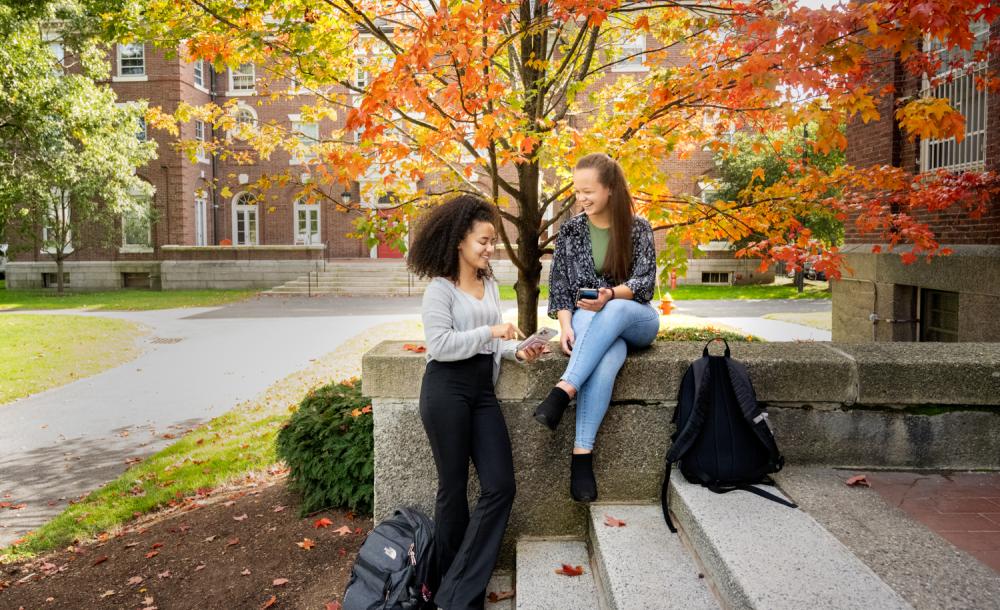
Griffin Financial Aid Office
Financial Aid travels with you for semester-time study abroad and covers everything from airfare and visas to books and ground transportation. For more information, visit the OIE financial aid webpage or contact the Griffin Financial Aid Office.
Applying for Study Abroad
Program information and application processes can be found on the Office of International Education website.
To study abroad, you must do both of the following things:
- Apply directly to your study abroad program or university for admission
Apply to the Office of International Education for transfer credit
Applications Deadlines for Transfer Credit
Semester Time
- October 1 for Spring Semester study abroad
- March 1 for Fall Semester study abroad
- Mid-February (for students applying for both funding and credit)
- April 1 (for students only seeking credit)
Important Approvals
To participate in semester-time or summer study abroad, you must have advising conversations with your academic department and Resident Dean. The Office of International Education advisers will help you to understand the process and answer specific questions.
Financial Aid and Summer Funding
Students receiving financial aid from Harvard can transfer their financial aid from Harvard to an approved semester-time study abroad program.
Students seeking to study abroad in the summer can also apply for competitive summer grants and funding available at the College from a variety of sources. To begin searching for funding for summer study abroad, visit the Harvard College Funding Sources Database for available options.
frequently asked financial aid questions for study abroad
Will it cost more to study abroad.
In most cases it will not cost more to study abroad. With a few exceptions, most study abroad programs cost less than a semester at Harvard. Students who receiving financial aid from Harvard can bring their aid with them to their study abroad program or host institution meaning that they will pay the same amount they would have paid to study at Harvard. Students who do not receive financial aid from Harvard will simply pay for the cost of the study abroad program (and won’t be charged for the semester that they are away from Harvard).
Can I use financial aid to study abroad during the summer?
Harvard’s financial aid program is only available for term-time for-credit study. Funding for summer experiences is available from a wide variety of offices and programs at Harvard. Good places to start include the Mignone Center for Career Success , the CARAT funding sources database , and the Office of Undergraduate Research and Fellowships .
Related Stories
Summer in the land of cappuccinos and vino.
Jake Class of '21 Alumni

Studying Abroad: A Love Letter to the Harvard Beijing Academy
Kalos Class of '23 Alumni

What I remember about studying abroad at Oxford
Liz Class of Alumni

Related Topics
Financial aid.
The Griffin Financial Aid Office provides need-based aid that allows us to bring the best students to Harvard, regardless of their ability to pay.
Your advisors can help you you plan your degree program or take advantage of unique academic opportunities such as study abroad.
As a college within a research university, Harvard undergraduates have access to unparalleled research opportunities. Learn about research at Harvard.
Toggle Academics Submenu
- The Student Experience
- Financial Aid
- Degree Finder
- Undergraduate Arts & Sciences
- Departments and Programs
- Research, Scholarship & Creativity
- Centers & Institutes
- Geisel School of Medicine
- Guarini School of Graduate & Advanced Studies
- Thayer School of Engineering
- Tuck School of Business
Campus Life
- Diversity & Inclusion
- Athletics & Recreation
- Student Groups & Activities
- Residential Life

Antônio Jorge Medeiros Batista Silva

Ei! My name is Antônio Jorge Medeiros Batista Silva (yes—four last names!) and I'm a '25 from Governador Valadares, Brazil. My journey to Dartmouth has crossed two continents, three countries, and over 10 schools—and I'm a strong believer that everyone's path to the Big Green was unique in a way. At Dartmouth, I am interested in studying Linguistics, Native American & Indigenous Studies, and Spanish. I am really passionate about social justice, learning languages, and the oxford comma!
Academic Program
Linguistics modified with NAIS!
Favorite Thing Right Now
Sunny days, my plants, and caramel macchiatos!
Hometown
Governador Valadares, Brazil
Pronouns
You are here.
- People Places Pines
How To Plan Your Study Abroad!
Antônio's d-plan, fall on campus.
This class is an introduction to the Spanish minor and major courses and, although I did not expect to particularly like it, it not only turned out to be my favourite but it made me start considering a degree in the department!
Winter On campus
In this class, we analysed different productions of Latinx American theatre. Prof. Analola Santana was probably the best person I met this year at Dartmouth. Being her student was a very important experience as I try to navigate my potential majors and minors.
Spring On campus
In this class, I was able to carve time out of my busy Dartmouth schedule to study and learn my Indigenous language: Krenak. With the help of Prof. Gokke, all students were encouraged to develop a final project that spoke to their community's needs for language learning and revitalisation. It was an extremely important class for me, not only academically, but also for my personal healing process.
Fall Madrid, Spain
I had the honour of spending my sophomore fall in Madrid, taking part in the Spanish FSP. There, Prof. Martín was not only a great professor, responsible for my favourite lecture of the program, but also an incredible company throughout our classes and in-country trips. Great way to wrap up my Spanish minor, honestly!
This was my second class in the NAIS department, and thus it took me one step closer to wrapping up my major. Nonetheless, it was Prof. Powell's genuine charisma and caring personality that made it my favourite of the term!
This course was definitely life changing! Prof. Pochedley, a visiting post-doc of the Potawatomi nation did a great job at keeping the students engaged while teaching us to see the land we inhabit as a source of knowledge and spirituality. In a majority Indigenous classroom, we got to develop individual projects related to our traditional homelands, learning to navigate the world through Native world lenses.
Prof. Gómez is one of those profs I've always wanted to take a class with. His work with the Horror genre in Modern Spanish literatures amazes me, and it was an honour to guide in-class discussions and develop my own research on the themes of science, testimony, and fear.
Winter New Zealand & Cook Islands
LING54 is an umbrella course: the actual content of the course may vary each year, but it is the common letter-number code to refer to the course taught abroad by your accompanying Dartmouth Linguistics professor. In this year's Linguistics Foreign Study Program (FSP), LING54 was a 'Language Documentation' class, wonderfully taught by Prof. David Peterson.
When choosing where to go to college, an important distinction for me was the possibility of going abroad for a term or two. If you've read my posts before, you know I can't help but hop on a flight whenever I can. Dartmouth is the 15th school I've attended—and I wasn't planning on it being the last. Since enrolling, I've been able to study in three other countries: Spain, New Zealand, and the Cook Islands, where I got to dive deeper into both of my majors. Having these experiences has enriched my undergraduate experience in ways I can't begin to describe, but to do so, a lot of prepping had to be done. In this quick list, I put together some of the things to take into account when planning to go abroad through Dartmouth
Choose the program wisely!

At Dartmouth, over half of the student body will study abroad at least once, and some—like me—will even do it more than once! The opportunities are endless, and include transfer terms, Language Study Abroad (LSA and LSA+ for more advanced classes), Foreign Study Programs (FSPs), exchanges, and internships or fellowships abroad. Both my programs were FSPs—meaning that I dedicated my time fully to classes within the organising department— but many of my friends have been to either an LSA or an LSA+, where they were fully immersed in a city where their target language was spoken. Other opportunities, like exchanges and internships, are often organised independently by the student, who can then request funding through one of Dartmouth's many resources.
Consider your major requirements!
To be able to attend two FSPs, I had to think ahead of all my major and degree requirements. Would the classes I take abroad count towards my major? Would it fulfil any of my degree distributive requirements? It is easy to feel overwhelmed with the possibilities, but one has to be realistic when applying to an off-campus program, which is easy, since most of the time you can check what classes will be offered at your host institution, making planning much easier.
Draw a realistic budget!
One of my fears of spending a term abroad was the financial uncertainty of not being able to work on campus—something I do every term I'm in Hanover. While my financial aid at Dartmouth is really generous, most of my pocket money comes from hours worked around here, either as a research assistant, a Spanish apprentice teacher, or as a blogger for the Admissions Office. Thankfully, however, my financial aid package has always been enough that, when transposed to the abroad programs, it would still offset most of my personal expenses, such as flights. So, in summary: take your expenses into account, but do not worry too much, as Dartmouth often has options to help you out!
Get familiar with your professors!
Studying abroad offers you an excellent opportunity to actually get to know your professors. Typically, for FSPs and LSAs, there will always be at least one Dartmouth faculty members accompanying your group, and often also teaching at least one of your courses. Having them around is definitely a privilege, as it allows you to bond over experiences that take place outside of the classroom—meaning, you are not limited to talking about the lecture topic. I feel like I got to learn about my professors in both my programs—their journeys to Dartmouth, their hobbies, and other academic interests—which I highly appreciate as someone interested in pursuing a career in academia as well.
Get to know your surroundings!
When abroad, especially if taking part in a larger Dartmouth program, it can be easy to isolate yourself into only hanging out with your own Dartmouth bubble. But the fact you're there—in this unique, distant location—with your friends from home does not mean you have to shut yourself from other opportunities. I always tried my best to explore the region I was in, even if just by myself. When else will you have the chance to visit these places? Try and take as much advantage of it as you can!
Click to show post info Post Information
- Study Abroad
- affordability
- international experiences
- Copy This Link
- Share to Facebook
- Share to Twitter
Posts You Might Like

Myths about Greek Life!
Greek Life can seem scary to some —including freshman year me. Here are some things I learnt when navigating these spaces!

My Pathway to the Language Requirement
At Dartmouth, there is an undergraduate requirement for language; after all, it is the liberal arts! Fulfilling this requirement looks different for various people and I will focus on my experience.

Working for the Hopkins Center
I have written about being a student worker plenty of times in the past, but I have yet to talk about one of my favorite jobs ever: ticket selling at the Hopkins Center for the Arts.

Meeting the Former Kosovo President
I had the chance to meet the former president of Kosovo!

Starting Spring Term with the Outdoors
Finding solace and camaraderie in Dartmouth's unparalleled outdoor community.

Dartmouth College Wind Ensemble Trip
Recently, I had the opportunity to take a trip to Cornell with the Dartmouth College Wind Ensemble (DCWE)!

The Return of Spring
Coming back from Spring break usually means coming back to an entirely different campus than the one you left in the Winter – but that was not the case this year! Read on to hear more...

Visiting Bath on my Foreign Study Program!
This week, I went with my Foreign Study Program (FSP) to Bath, England, for a fun day trip!

Springterim Interfaith in DC: Part 2
In addition to houses of worship, we went to museums and organizations during our week in DC.
You are using an outdated browser. Please upgrade your browser to improve your experience. Thanks!

- SPD's Mission
- SPD Admissions
- Admissions FAQ
- Application Links
- Non-Matriculated Students
- International Students
- Costs and Funding
- New Student Roadmap
- Orientation Information
- Degree & Certificate Programs
- Graduate Courses
- SPD Bulletin
- Commencement
- Off-campus Cohorts
- Center for Corporate Education
- Center for Teaching and Learning in Community
- Certification & Licensing Workshops
- School Administrator Exam Preparation
- Osher Lifelong Learning Institute
- Senior Auditing
HEA Study Abroad Opportunities
- Study Abroad China
- Study Abroad Italy
School of Professional Development | Social and Behavioral Sciences Building, 1st Floor South | Stony Brook, NY 11794-4310 (631) 632-7050 | [email protected] | Directory | Quick Links
Wexmester One Summer 2024
This webpage serves both undergraduate & graduate students, may 13 through june 14, 2024 15 assorted core & upper-division undergraduate courses several public health graduate courses.
We make every effort not to alter the program as described on this webpage. If changes occur, we notify accepted students immediately via email.
Act Now to Take Advantage of a Generous Support Gift of at Least $800
Standard application deadline: february 26, 2024.

This Webpage: Section by Section
Skip Directly to Assorted Undergaduate Courses in Detail Skip Directly to Public Health Graduate Courses in Detail
Skip Directly to Inputting Data (Stage One and Stage Two)
Top of Page
Brief Overview
Live your passion: claim the international advantage, giving you the international edge that employers and graduate schools seek, study abroad supercharges your resume. it can be the critical differentiator in an application portfolio or during a job interview. (in the 2020 qs global employer survey, 25% of the 10,000+ responding companies identified transnational experience as a recruitment priority.) to empower their students with this competitive advantage, leading universities have established overseas campuses., always focused on student success, georgia southern has chosen ireland for its european base. join us during minimester one (“wexmester one”) of 2024 for a fun, career-boosting, and life-enhancing experience in the emerald isle..

Where We Live & Learn
Live your passion: acquire in-demand global skills, both personal and professional, employers, graduate schools, and advanced professional-training programs seek candidates who can demonstrate transnational competencies..

Menu of Courses
Live your passion: learn beyond borders, benefitting from the expertise of irish partners in education, business, the arts, and other domains, we deliver exceptional learning opportunities, many of them outside the classroom..

UNDERGRADUATE COURSES: QUICK LOOK
Select one morning course and one afternoon course ordinarily, you can take up to seven credit hours during a summer minimester skip to detailed look, graduate public health courses: quick look, select one morning course and one afternoon course.

COURSES IN DETAIL
Undergraduate morning courses.

Undergraduate Afternoon Courses
Optional additional (third) undergraduate course: 1 credit hour.

Graduate Morning Courses
Graduate afternoon courses.

Travel Logistics
Live your passion: secure your passport, if you don’t yet have a passport, start the application process immediately if you have a passport that has expired — or that will expire before august 14, 2024 (two months after our scheduled return date) — renew it. start the renewal process immediately..

Two-Stage Application
Live your passion: build a global network, when studying in wexford, professors and students work as a team to identify problems, gather data, craft strategies, and enact solutions — just as in real-world professional situations..

Application: Stage One
Application: stage two.

Last updated: 3/19/2024
- Wexford Campus Homepage
- Spring & Summer 2024 • Overview of Programs & Courses
- Spring 2024 • Health Professions Program \ About & Apply
- Summer 2024 • Wexmester One Courses (May-June) \ About & Apply
- Summer 2024 • Wexmester Two Courses (June-July) \ About & Apply
- Summer 2024 • Wexford-Normandy Program during Wexmester Two
- Scholarships
- Accommodations in Wexford
Engage the "Explore & Apply" button to discover our Spring & Summer 2024 courses and programs — and to launch your application.
Engage the "Talk to Tina" button to email Wexford Campus specialist Ms. Tina Parker, who can answer your questions about courses, programs, scholarships, and more. [email protected]
Wexford Campus Office
Interdisciplinary Academic Building Room 2012 P.O. Box 8100 Statesboro, GA 30460
912-478-8424
Donations that Empower
For a student who dreams of studying at Georgia Southern University’s European Campus in beautiful, historic Wexford, Ireland, scholarship support can make all the difference. Imagine the impact of your gift on a young person who may never have flown or owned a passport before. By means of high-value learning, research, and networking opportunities, Ireland helps our Georgia Southern Eagles soar.
Via the “Donate” button, please direct your tax-deductible contribution to any of the following funds at the Georgia Southern University Foundation.
• GS 0064 The Study in Wexford Fund • GS 0968 The Wexford-Savannah Fund • GS 3604 The Eddie Ivie Scholarship for Study in Ireland • GS 3760 The Helen Ryan Collins Scholarship in Irish Studies • GS 0347 The Hibernian Society of Savannah Scholarship in Irish Studies
Should you have questions or should you wish to discuss other giving opportunities related to the Wexford Campus, please email [email protected] . Thank you — and Go Eagles!
Study Abroad Wexford, Ireland Interdisciplinary Academic Building, Room 2012 · PO Box 8100 ·Statesboro, GA 30460 912-478-8424 · [email protected]
The Daily Northwestern
Sign up to receive our email newsletter in your inbox.

The Daily Explains: Options for saving money before and during studying abroad
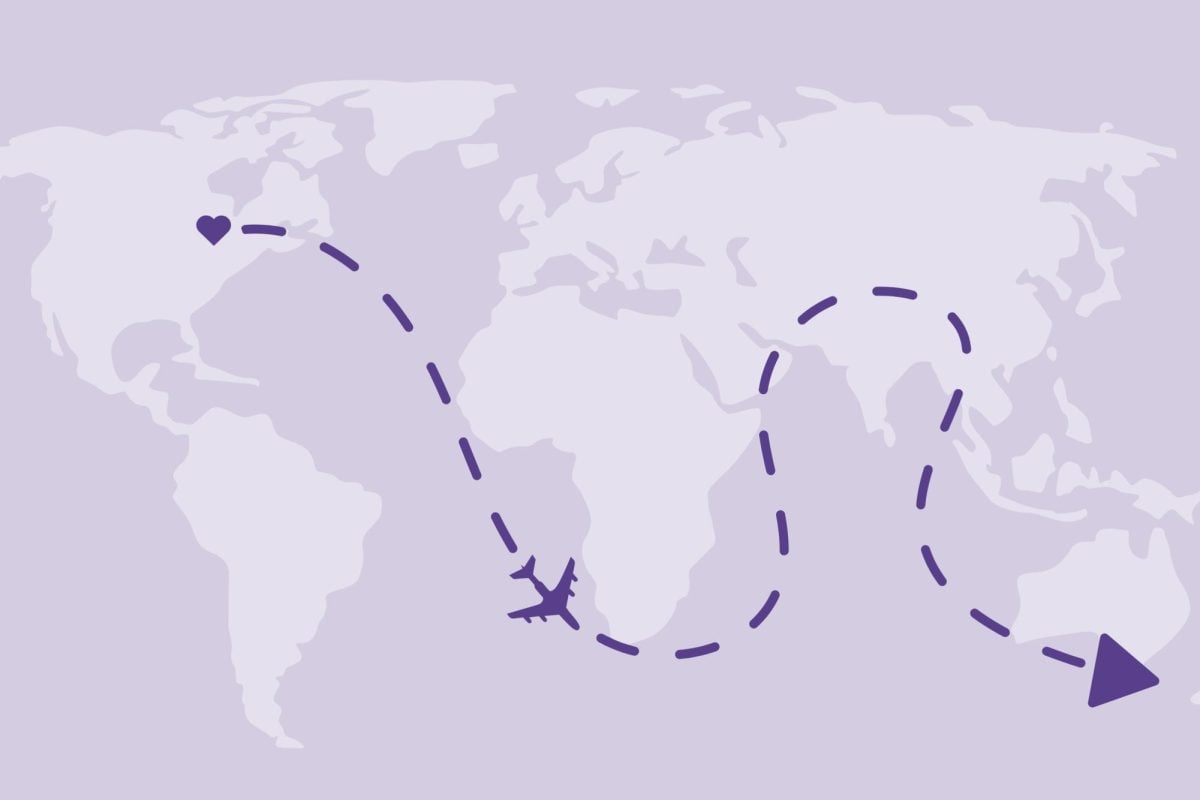
From Uganda to Japan, about 50% of Northwestern students choose to go abroad during their time at NU, according to the Global Learning Office. However, with varying costs of attendance at more than 150 available GLO programs, financing a study abroad experience can be quite challenging. The Daily is here to break down options for saving money.
For unaffiliated programs, funding options are limited to scholarships. However, NU offers need-based aid for NU programs, Global Engagement Studies Institute, Northwestern exchanges and affiliated programs.
Need-Based Aid
GLO works closely with NU’s financial aid office to determine financial aid packages, GLO Director Sara Tully said. The aid covers tuition, food, cost of living, books and travel to the site, according to Tully.
“We have the cost of attendance calculations for every single program,” Tully said. “The range is quite broad.”
For programs that cost more than a quarter at NU, aid will be increased, and for students with federal work-study, a subsidized loan will replace those funds, according to GLO’s website.
There is also the Bridge Builder program, which covers the cost of roundtrip airfare if financial aid hasn’t hit a student’s account yet. After aid is applied, the school will be reimbursed.
Loans and Scholarships
Similar to on-campus undergraduate programs, students can take out loans to cover study abroad. Tully said this is often used as a supplement for students whose aid doesn’t cover the full cost of their experience.
Students can also apply for scholarships to help cover the cost of academic-year and summer study abroad programs.
Scholarships are especially beneficial for students participating in unaffiliated programs, since NU aid doesn’t cover unaffiliated programs.
General Tips and Planning
One thing financial aid doesn’t factor in is travel to other places, which is a common activity during study abroad. Tully said equity of experience is something GLO is concerned about and trying to improve.
Medill sophomore Sophia Vlahakis is planning to study in Madrid next fall, and said she’ll look for inexpensive transportation and lodging when she travels to other cities.
“I know I’m going to want to travel to big cities, but I’m going to look to stay on the outskirts and I’m very open to staying in hostels or rooming with as many people as possible,” Vlahakis said.
Tully said GLO offers several financial trainings, information sessions and budgeting workshops as part of its pre-departure program. She said budgeting with foreign currency can be “more complicated,” especially for students from the U.S.
Weinberg senior Sophie Brill, who studied in Copenhagen last fall, said paying attention to where you study abroad is also important for planning, as some cities have a higher cost of living than others.
“I wish I had spent more time learning how studying abroad in different places would impact me financially,” Brill said. “I had to be really disciplined during the week at school, trying to make food and not eat out, and not spend a ton of money outside of when I was traveling.”
Tully said deciding when to study abroad can also impact the total cost. She added that studying abroad in the summer can be a less expensive option, although doing so adds an additional quarter for financial planning.
While study abroad can dig deep into the pockets, planning ahead, talking to financial advisors and using the available resources can help to minimize the costs.
Email: [email protected]
Related Stories:
— Lights, camera, action: RTVF students take film to Prague
— Students studying abroad in the fall scramble to find subletters
— Students studying abroad reflect on their programs, develop new perspective on Northwestern
- Bridge Builders Program
- Global Engagement Studies Institute
- Global Learning Office
- Sophia Vlahakis
- Sophie Brill
- study abroad

- Editorial Board
- Former Daily Editors
- Students Publishing Company
- Classifieds
- Today’s Paper
- Print Archives
- Comment policy
- Terms of Use

25,000+ students realised their study abroad dream with us. Take the first step today
Meet top uk universities from the comfort of your home, here’s your new year gift, one app for all your, study abroad needs, start your journey, track your progress, grow with the community and so much more.

Verification Code
An OTP has been sent to your registered mobile no. Please verify

Thanks for your comment !
Our team will review it before it's shown to our readers.

- News Updates /
Study Abroad: University of Birmingham Offers Fully Funded Scholarships for Nigerians
- Updated on
- Apr 26, 2024

Calling all ambitious Nigerians with a PhD dream! The University of Birmingham is offering a fantastic opportunity for four exceptional students to pursue their doctoral studies in the UK. This fully-funded scholarship program, called the CENTRE-UB scholarship, covers both tuition fees and living expenses.
Study Abroad: Explore degrees that emphasize workshops, projects, and practical skills! Degrees That Let You Learn By Doing!
Scholarship Covers Everything
The CENTRE-UB scholarship is a dream come true for PhD students. It provides a tuition waiver, eliminating the financial burden of university fees. On top of that, it offers a generous living stipend of £19,237 (approximately N30 million) to cover your expenses while you study. This means the scholarship program takes care of everything, allowing you to focus solely on your research and academic pursuits.
Eligibility and How to Apply
To be eligible for this scholarship, you must have a stellar academic record. Applicants need to have obtained at least a second-class upper division from a recognized university. This applies to both universities in the UK and equivalent qualifications from universities outside the UK.
The application deadline is fast approaching – applications close on May 16, 2024. Shortlisted candidates will be interviewed in June 2024.
Study in Ireland: 5 UCC International Scholarships for Non-EU Students
Here’s what you’ll need to get your application ready:
- Academic transcripts
- Curriculum Vitae (CV)
- Reference letters
- The CENTRE-UB application form (available for download on the University of Birmingham website)
Once you’ve completed the application form, submit it electronically along with your other documents to [email protected] . Don’t forget to double-check the application details to ensure you’ve included all the required credentials.
Space is Limited – Apply Now!
The University of Birmingham is only awarding four CENTRE-UB scholarships for the 2024/2025 academic year. This is a highly competitive opportunity, so ensure you submit a strong application that highlights your academic achievements and research potential.
Another Scholarship Option: Master’s Degree at University of East Anglia
If a Master’s degree is more your goal, there’s good news! The University of East Anglia is also offering a scholarship program for international students pursuing a Master’s degree in Global Plant Health. The David Sainsbury Scholarship is another fully-funded program, covering tuition fees and even providing an additional £4000 (approximately N5.3 million) to help with travel costs.
Study Abroad: Applications Invited for Cyprus Institute of Neurology and Genetics Postgraduate Scholarships for 2024-25
Don’t Miss Out on Your Chance to Study in the UK!
These scholarships present a golden opportunity for Nigerian students to pursue their academic dreams in the UK. With all tuition fees and living expenses covered, you can focus on your studies and gain valuable experience at a world-renowned university. Research the programs, prepare your applications carefully, and take this exciting step towards your academic future!
PhD Opportunity in UK: University of Birmingham Offers Fully Funded Scholarships for Nigerians
Study Abroad: UNESCO Prize for Girls and Women’s Education Nominations Applications Open for 2024
These scholarships present a golden opportunity for Nigerian students to pursue their academic dreams in the UK. With all tuition fees and living expenses covered, you can focus on your studies and gain valuable experience at a world-renowned university. Research the programs, prepare your applications carefully, and take this exciting step towards your academic future! Want more such updates? Make sure you follow Leverage Edu News Updates .
Leverage Edu News Desk
Leave a Reply Cancel reply
Save my name, email, and website in this browser for the next time I comment.
Contact no. *

Connect With Us
25,000+ students realised their study abroad dream with us. take the first step today..

Resend OTP in

Need help with?
Study abroad.
UK, Canada, US & More
IELTS, GRE, GMAT & More
Scholarship, Loans & Forex
Country Preference
New Zealand
Which English test are you planning to take?
Which academic test are you planning to take.
Not Sure yet
When are you planning to take the exam?
Already booked my exam slot
Within 2 Months
Want to learn about the test
Which Degree do you wish to pursue?
When do you want to start studying abroad.
January 2024
September 2024
What is your budget to study abroad?

How would you describe this article ?
Please rate this article
We would like to hear more.
Have something on your mind?

Make your study abroad dream a reality in January 2022 with
India's Biggest Virtual University Fair

Essex Direct Admission Day
Why attend .

Don't Miss Out

IMAGES
VIDEO
COMMENTS
Choosing where to study abroad during a PhD journey involves considerable considerations. Factors such as academic reputation, financial aid, language of instruction, networking opportunities, research facilities, and support services are important factors to take into consideration. Keep reading to learn more about these factors and feel more ...
Find out what it's like to study a PhD in Australia, including advice on visas, applications & scholarships. A culture of innovation and creativity makes Sweden a popular choice for international PhD students. Our guide covers universities, doctoral programmes, fees, funding and visas. Holland and the Netherlands are a welcoming destination for ...
I even know of (some) formal exchange programmes that are established to send students abroad. For instance, in Singapore, programmes exist for both incoming and outgoing visiting PhD students. These exchanges can last between 3 months and 2 years, as far as I know, and are supported by government grants.
4 things to consider before studying abroad as a PhD student. 1. Choosing your research topic. We get it: you want to write something impactful that you can bring forward in your career. It's normal to feel stuck when thinking about a research topic. Lucky for you, there are many ways to be inspired.
Research and study programs and countries extensively. The following are tips to get you started. Tip 1 Tip 2 Tip 3 Tip 4 Tip 5. Commit to what you want to study and then search for the right program. According to Ramon, "There is a program available abroad for nearly any discipline. You just have to look.".
1. Improves Your Language Skills. By studying abroad, you'll have the opportunity to hone your language skills. While studying a language in class is rewarding, applying it to the real world is an entirely different experience. It's likely you'll learn the language faster because you're practicing it regularly.
During your PhD abroad, you will benefit from learning new techniques, attend lectures by "local" experts, be part of a unique research community which itself is international and have access to resources such as archives, collections, materials and equipment that are unique to your location. But bear in mind that, it will most likely involve ...
For UK universities, there are generally two ways of applying. You can either apply directly through the university's website or you can make an application through the UCAS Postgraduate system. In Spain, Italy and Germany, before applying to a PhD you will first need to pass a pre-application process.
Studying for a PhD will involve a lot of reading, testing, writing and research. Don't worry, you won't have to do it all alone. On a PhD programme, you can usually interact with other doctoral students at seminars and workshops. In addition, you will have an appointed supervisor, who is usually an expert in the field, helping you refine ...
The immigration office at your destination country will detail the minimum amount you need to show you have. Immigration offices usually give their own list of accepted documents but bank statements and scholarships letters are the most widely accepted. Bank statements - You can provide bank statements for a set period of time in the past.
According to Eurostat, in 2004 (the most recent statistics available), only 0.6% of United Kingdom (U.K.) students travelled abroad for a Ph.D. The numbers are higher--around 2%--in France, Denmark, the Netherlands, Sweden, and Germany. They reach 8% in countries outside Europe's economic centre, like Bulgaria, Ireland, Malta, and Slovakia.
Many Georgetown students' original study abroad plans may have been interrupted during Fall 2020 or cancelled in subsequent terms. As vaccines are rolled out in more countries, restrictions on travel and visas will hopefully begin to open up. ... Graduate School. Study abroad as a grad student: Some graduate programs in the United States have ...
In addition to funding through the ERASMUS program, there are many other ways to support a stay abroad during the doctoral studies. For example, the German Academic Exchange Service (DAAD) offers both a one-year scholarship for doctoral students and corresponding short-term fellowships. The Fulbright Commission promotes 4 to 6-month stays in ...
Professors and supervisors also move around a lot, especially in Europe researchers are generally more mobile. Doing a PhD abroad allows you to build a global network that you can leverage during your degree and for years after. Unexpected opportunities. Like networking, doing a PhD abroad opens you up to a lot of different paths.
There are two major ways to earn a doctorate degree abroad; you can apply for a full-time PhD programs directly through a foreign university or you can apply for an exchange program to study abroad for as short as a summer session or as long as a year. It will generally take about three years to earn your doctorate degree abroad.
Study abroad. As a truly global institution, the University of Oxford understands the importance of international experiences to your academic, career and personal development. There are opportunities to study, work, or undertake research in dozens of countries across the globe. For a wide range of study, exchanges and research opportunities ...
Students interested in attending grad school abroad can expect to pay anywhere from $500-$30,000 USD. In countries like France, Germany, and Iceland, international graduate students are only responsible for paying a small amount of money in fees. In the UK, Australia, and Ireland, students will pay on average between $15,000-$30,000 USD.
Tips for going abroad. During your PhD studies, you are required to take a study tour abroad and get the opportunity to attend another active research environment. A tour may be at a foreign research institute or private research company, etc. Just how long a research tour should be differs from Faculty to Faculty and would depend on the nature ...
Research study abroad for PhD candidates. If you're a PhD candidate at a university outside Australia, you can apply to conduct research at UQ through our study abroad program. This provides opportunities for outstanding research students from overseas to undertake part of your research degree with our leading researchers.
Typically it's not framed as a 'study abroad' but rather, a 'research year,' or something similar. Generally, it has to make sense with the context of your research: if you're looking at the mutational differences in the dialects of Scottish Gaelic it makes sense for you to go to Scotland for a year. In my experience it's not like an undergrad ...
To start planning your study abroad experience, you can meet with an Office of International Education adviser during drop-in hours (Monday-Thursday 2:00-4:00 p.m.). You can also meet with a student adviser who has already studied abroad for at least one semester.
How To Plan Your Study Abroad! When choosing where to go to college, an important distinction for me was the possibility of going abroad for a term or two. If you've read my posts before, you know I can't help but hop on a flight whenever I can. Dartmouth is the 15th school I've attended—and I wasn't planning on it being the last.
Sometimes, Ph.D. programs have formalized exchange years. If that is not the case, then if you go abroad to collaborate with the reasonable expectation to come back with a paper in progress to include in your thesis, and funding is secured (most likely provided by the foreign collaborator), then this will probably be fine.
Challenges of study abroad: Data from the Institute of International Education found student interest in study abroad is rebounding post-pandemic, with 188,753 students studying abroad during the 2021-22 academic year. The largest share of students participate in a summer term (49 percent) or over one semester/two quarters (33 percent).
Study Abroad in Italy. During this three-week travel-study program, graduate students will visit six higher education institutions in nine historic cities. View Details» Study Abroad in China. A 15-day study tour that examines China's higher education institutions by visiting five of its leading universities in the major cities of Beijing ...
As a part of the fellowship, these graduate students participated in a study abroad experience to Southeast Asia to enhance the skills they have acquired throughout their time in the fellowship. Find out more about this experience directly from these NNF fellows throughout this #StudyAbroadStories series!
Giving you the international edge that employers and graduate schools seek, Study Abroad supercharges your resume. It can be the critical differentiator in an application portfolio or during a job interview. (In the 2020 QS Global Employer Survey, 25% of the 10,000+ responding companies identified transnational experience as a recruitment ...
From Uganda to Japan, about 50% of Northwestern students choose to go abroad during their time at NU, according to the Global Learning Office. However, with varying costs of attendance at more ...
The University of Birmingham is offering fully-funded PhD scholarships for Nigerians and the University of East Anglia has a fully-funded Master's scholarship in Global Plant Health. Study Abroad. ... Study Abroad: Canada to Decrease the Number of New International Study Permits Issued to 360000 Students in 2024 Leverage Edu News Desk; ...
At the heart of her course, Sociology of the Environment (SOC/ENSS 244), Amanda McMillan Lequieu, PhD, assigns students a multi-stage case study and guides them through a process that exposes them to the skills needed to analyze research and use that information to make a persuasive case for a potential policy measure.